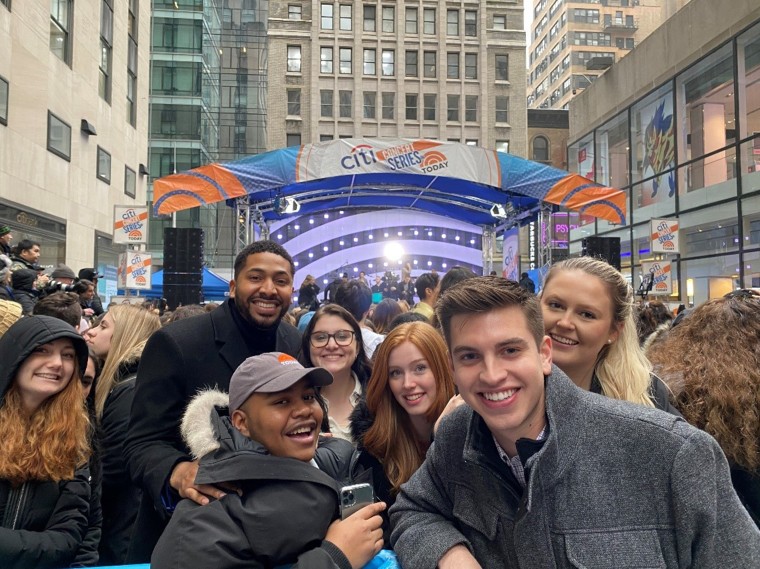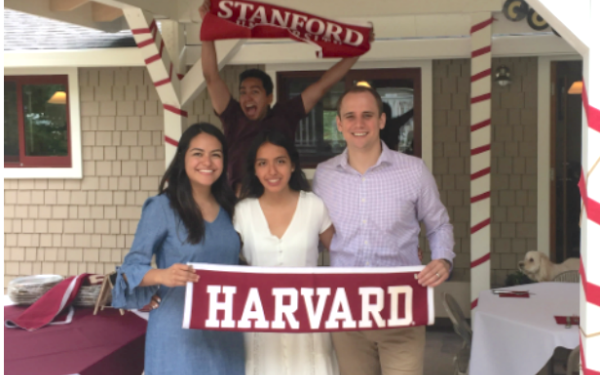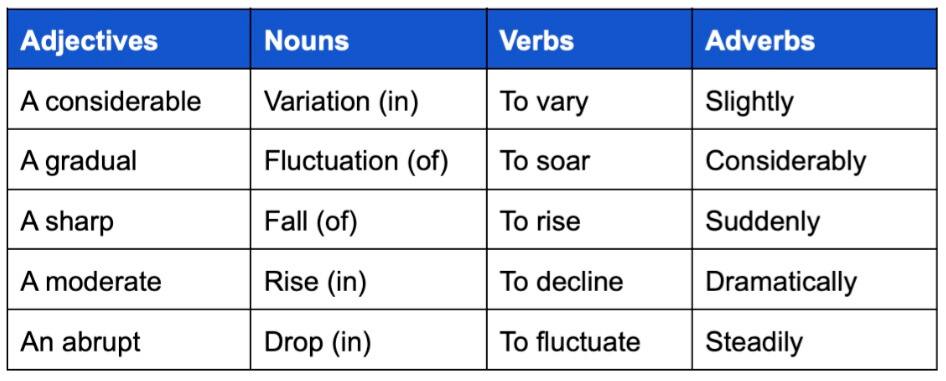The Gap Year Essay: Pros and Cons
Looking for a gap year essay example? This argumentative essay describes all the pros and cons of taking a gap year before college.

Introduction
- Pros of taking a gap year
- Cons of taking a gap year
There is an ongoing debate on whether high school graduates should take a year off (a gap year) before joining college. A gap year is a break from formal education and controlled environment that is otherwise monotonous and exhausting. Gap year is common in European countries and also in Australia and it is quickly catching up in America. It is an idea that even the most prestigious colleges and universities are getting fond of and thus encourage high school leavers to try it out.
Gap Year Pros
After completing high school, students tend to suffer from ‘information overload’ and exhaustion (Naomi, 2008). A year off may be helpful to such a person who has had an academic burnout and can use some time out to ‘recharge his or her academic battery’. The gap year will present the student with a chance to refresh his system and get a renewed energy which he will use to face the next phase of education.
Another reason as to why taking a year off is important is the fact that the person is able to build on some self confidence and their maturity level. Even top level universities are encouraging school leavers to take a year off since they reckon that those who do so, bring good values to the institution since they have had a taste of ‘outside life’ and will have a serious perspective towards life.
It is believed that those who take a gap year will be more focused and ready to face the more taxing institution of higher education. It is usually encouraged that students taking the gap year do so in a manner that will help them add some experience in a working environment while earning some money. They may also look for an internship which will help them have a feel of an organization and how it operates thus the student will make their curriculum vitae more appealing (William, 2000).
A gap year also offers chance for the high school leaver to do a thorough university search where he will look for the right institution that offers the course that he wants to engage himself in. The year off presents the school leaver with a chance to find the academic forte that he is most comfortable with. While enjoying a gap year, the school leaver will decide on what he or she wants to major in and this in turn will help them become more focused when joining university.
A school leaver may also spend his gap year travelling around hence broadening his horizon. By travelling abroad, the school leaver may discover new talents, gain new skills, learn new languages and visit various historical sites and this will help him have a diverse and broader perspective of life and thus make him more serious and focused when he gets to university.
Travelling abroad will also help the school leaver mingle with people of different races and cultures, a factor that helps them understand and appreciate diversity. This turns out to be very helpful to the high school leaver since he will encounter a multiracial and multicultural environment in the university and can therefore easily adapt, settle and start learning (Shellenbarger, 2010)).
A high school leaver who takes a gap year has a better chance of handling the peer pressure in the university. Because the high school leaver who was previously under the careful watch of his parents, will now be left on his own and thus the leaver who enjoyed his gap year travelling or being on an attachment will have built his self confidence and hence will tend to fight off peer pressure unlike the school leaver who joins university immediately where he will be hit by the reality of ‘first true freedom’ (World Inhabit, 2007).
Gap Year Cons
Besides the fact that taking a gap year will help to refresh the school leaver’s system, the gap year may also turn out to be disastrous towards the student and his career. This usually happens when the high school leaver fails to plan properly his schedule for the year off. Mostly, the high school leavers will waste a whole year and may not gain any helpful experience.
A mismanaged gap year may turn out to be too expensive to the high school leaver and, hence, deplete resources leaving him with insufficient funds to join university. Taking a gap year may result in a higher university budget as tuition fees tend to increase annually. William (2000) notes that “engaging in a gap year may result in the student missing a slot in the university especially in courses that are competitive”.
Also taking a year off may at times make the student lose momentum on studying and this may cause him a drop out of college or take a longer time to complete his course than expected. A gap year may lead to the high school leaver being demoralized by trailing his fellow classmates during the whole year (Sanjou, 2008).
A person who takes a gap year may fail to develop good skills and habits that may affect and help in his career and consequently fail to fit in the taxing university environment. A high school leaver who takes a gap year may enjoy real freedom having a time of his life and may find it very difficult to come in terms with reality that may end up by failing to join the university (Eunson, 2008).
Taking a year off may consequently lead to a delay in the beginning of a person’s career which means that the person will start earning at a later stage in life than he was supposed to. Also there are companies which plan trips for the school leavers thus reducing their level of self responsibility and thus don’t help build self confidence since they plan everything for the school leavers who should instead be doing things on their own to help build their confidence (College Confidential, 2010).
A high school graduate should consider the options he or she has when choosing whether or not to take up a gap year. The individual through numerous consultations with his parents, school counselors and sponsors should weigh between the pros and cons of taking up a gap year or not.
Ultimately, the decision lies in the high school leaver’s hands. This means that should the school leaver decide that he needs a break from academic pressure, he should ensure that he spends his gap year productively in a manner that will help boost his career path. A year off that is well spent by the school leaver can help boost a person’s confidence and maturity level. He will have a broader perspective of life and hence will give the university the seriousness it deserves once he gets enrolled.
Many universities in Europe and currently in the United States have come to appreciate the importance of taking a year off. Reports made by a number of university deans show that most people who take a gap year before joining university usually have a higher degree of seriousness, maturity and understanding than those who join university immediately after high school.
College Confidential. (2010). Pros and Cons of Gap Year . Web.
Eunson, B. (2008). Communicating in the 21st century 2nd edition . New York: John Wiley.
Naomi, G. (2008). The college gap year. Advantages and disadvantages of taking a gap year. CA: Sage.
Sanjou .G. (2008). Taking a year off is advantageous . New York: John Wiley.
Shellenbarger, S. ( 2010). Delaying College to Fill in the Gaps . Wall Street Journal.
William, F. (2000). Time out or Burn Out for the Next generation. New York, NY: McGraw Hill/Irwin.
World Inhabit. (2007). The Advantages and Disadvantages of Taking a Gap Year. Web.
- Chicago (A-D)
- Chicago (N-B)
IvyPanda. (2018, October 17). The Gap Year Essay: Pros and Cons. https://ivypanda.com/essays/gap-year/
"The Gap Year Essay: Pros and Cons." IvyPanda , 17 Oct. 2018, ivypanda.com/essays/gap-year/.
IvyPanda . (2018) 'The Gap Year Essay: Pros and Cons'. 17 October.
IvyPanda . 2018. "The Gap Year Essay: Pros and Cons." October 17, 2018. https://ivypanda.com/essays/gap-year/.
1. IvyPanda . "The Gap Year Essay: Pros and Cons." October 17, 2018. https://ivypanda.com/essays/gap-year/.
Bibliography
IvyPanda . "The Gap Year Essay: Pros and Cons." October 17, 2018. https://ivypanda.com/essays/gap-year/.
- Travelling through the dark
- Health Risk in travelling
- The Pros and Cons of Sex Education in Schools
- The New Meaning of Educational Change
- Final Analysis of Educational Experiences
- “Critic’s Notebook: Debate? Dissent? Discussion? Oh, Don’t go There” by Michiko Kakutani
- Education: Quality - based Vs. Exam - based
- Attitudes towards Education
Bobbie’s Bests for Less: 50% off handbags, skin care, more
- TODAY Plaza
- Share this —

- Watch Full Episodes
- Read With Jenna
- Inspirational
- Relationships
- TODAY Table
- Newsletters
- Start TODAY
- Shop TODAY Awards
- Citi Concert Series
- Listen All Day
Follow today
More Brands
- On The Show
How a gap year before college changed my view on life — and my future
“It’s day one of a really uncertain year … here’s to adventure, I guess.” I naively wrote those words on the first page of a brown leather journal that followed me into more than 100 random “host houses” that I nomadically called home for a year.
Like many 18-year-olds, high school was the necessary stepping-stone for college. I was insistently Type A in high school with an intense focus on top grades and engaging in extracurriculars, with the foresight of a well-dressed college application and a sheer determination to prove that I would find success upon leaving my small Texas hometown.

But I’ll always remember the melancholic feeling of a rolled diploma in my hand as I walked across the graduation stage. Much of my academic efforts had felt more like sleepwalking rather than learning. I craved an experience that would make me feel strongly about something — a cause, mission or profession, I wasn’t sure.
In July, a month before my college move-in date, I found that opportunity: I had applied for and was selected to travel across the country on behalf of the Future Farmers of America, a nonprofit organization I had been involved with in high school. The role required deferring a year of college to visit and speak at different high schools — 317 in total — and advocate for agriculture education in the classroom.
An FFA staff member handed me the keys to a Ford truck that was wrapped with elaborate rolling fields of crops down the side doors. I was given a list of schools to visit, a travel partner named Conner, a couple weeks of training and a clothes hanging rack for the back seat.

I wasn’t a wanderlust bohemian. I had a plan. A plan to go to college, major in business and become a CEO. But something within me knew before I attempted to lay out a career path, I needed to see more. My gap year didn’t squash my aspirations — it challenged them, flipping my 10-year plan on its head, making me ask why.
I needed to see more. My gap year didn’t squash my aspirations — it challenged them, flipping my 10-year plan on its head, making me ask why.
Washington, D.C., was the first travel stop for Conner and me. I’ll never forget an early morning that took place on the steps of the Lincoln Memorial. I sat in awe as the sunrise’s gleam reflected on the water. To my right I smelled and peripherally saw a large, hairy animal — maybe standard in my hometown Gilmer, Texas, but not on the National Mall.
“Goat’s name is Miles,” said a voice hidden behind the large mammal. “And I’m Steve. We’re sort of a team.”

Interest piqued, I petted Miles and listened to Steve share the duo’s unlikely journey. From Seattle, Washington, to Washington, D.C., they had trekked 3,600 miles over four years, raising over $100,000 for a startup orphanage in Kenya. Quitting his job, departing normalcy and choosing an adventure that impacted and united folks across the globe.
Steve and Miles didn’t inspire me to call my admissions counselor and bail on my college degree, but they did challenge me to think about my life in its limited totality. That encounter left me wondering how I wanted to help the world, how I planned to change it, and thinking less about what was ordinary and practical. As an 18-year-old, being given the freedom to think imaginatively before re-entering the classroom walls provided a substantial framework for when I began at my university.
In total my gap year brought me to 18 states and across 60,000 miles. Each night, organized through FFA, a volunteer guest host kindly provided us a place to sleep. A new face, new life story and a newly gained perspective. Those lessons learned around 150 random American family dinner tables may have been my most significant takeaway.
It’s not lost on me that my experience was not a typical gap year. Host homes, school visits and living out of a truck are not the gap year norm. But regardless of structure, gap years take on their own mold. And when approached with intentionality, they produce an environment where failure is encouraged and growth is inevitable.

Part of my gap year with FFA was working alongside rural media to promote agriculture education. I became fascinated by media work: local radio shows, writing scripts for promotional videos, and the couple times I got to be on a camera set — all things I never saw much of growing up and had no clue could be a real profession.
I minored in journalism at Texas A&M University a few years later, wrote for the school’s satirical paper and applied to over 50 journalism internships throughout college.
The spring of my junior year I interned at TODAY and soon became a full-time employee — all thanks to a year that allowed me to make sense of where my passions met profession.
The last words on the final page of that now tattered journal from my gap year read, “Too much to capture on paper but I have written enough to transport me back to these wonderful moments of life.”
More than fond memories, I find those moments have etched themselves into my core self, helping direct the next adventure ahead.
What is a Gap Year? Why take a Gap Year?
Taking a gap year – introduction.
Many students and parents automatically think of college as the next step after high school. However, there are other options for students who feel as though their educational and professional trajectories aren’t quite so linear. Perhaps you’ve heard that a gap year is a great option that provides students with an outside-the-norm, enriching, and educational experience. But, you may be wondering, what is a gap year?
We’ll shortly get into the “gap year” meaning, but it’s also important to understand that gap years may not be for everyone. However, when taken with intention, gap years are often life changing times. After reading this article you’ll understand the gap year meaning and be better prepared to decide if the gap year experience could be for you.
In this article we’ll explore the ins and outs of gap years, including:
- What exactly is the definition of a gap year?
- Potential gap year ideas
Gap year statistics
- What specific gap year programs exist?
- How to decide whether to take a gap year
- General gap year advice, and more…
What is a gap year?
Now that you’re intrigued by the topic, let’s get into its meaning. What is a gap year? A gap year is a wonderful time for students to have an experiential learning experience outside of the traditional educational setting. Think of it as a year full of extracurricular activities for your resume.
There are many gap year programs that can assist students in deciding what to do during their gap year. However, there is certainly no one right or wrong gap year program. The gap year experience will vary greatly from person to person, and there is no shortage of gap year ideas that students can choose from.
A likely question to follow, “What is a gap year?” is, “Why take a gap year?” Students can benefit from taking a gap year after high school in order to learn more about themselves and further pursue areas of interest. It’s a time to dive into extracurricular activities for your resume. Gap year programs are a great way to gain confidence and recharge before heading into four years of university .
Definition of a gap year
The answer to “what is a gap year” and the gap year definition is simple: a year taken off from university or college in order to pursue other goals. A gap year may also refer to a year taken after college when graduates don’t go straight into the workforce in their field. It’s important to understand that a gap year isn’t a “year off,” as many describe it. It’s a time to experience, learn, and gain awareness. These gap year experiences also serve as meaningful extracurricular activities for your resume.
Students typically take a gap year after high school and before college, however, many university graduates opt to take a gap year after college. A gap year is an opportunity to do some experiential learning in order to gain confidence and experience .
There are many reasons that students might choose to take a gap year:
- Experience something new (travel, internships, volunteering) before college
- Work and save money before college
- Reapply to college after graduating from high school
What to do during a gap year?
We’ve covered, “What is a gap year?”, a year taken to pursue a passion or gain professional experience. Many gap year ideas exist, as many students have taken gap years that look completely different. No gap year experience is right or wrong. The purpose of a gap year is whatever you want it to be. When thinking about what to do in a gap year, think about what you want to gain during that year. As long as you put intention behind it, then you’re sure to have a successful gap year experience.
There are many things to consider before deciding to take a gap year. If you decide that it’s right for you, then there are ample gap year ideas and gap year programs to assist you in deciding how to spend your time.
Students can take the time to travel and have a cultural experience, volunteer and get involved in the community, or intern and gain professional experience. Gap year ideas are endless!
When looking for gap year advice and considering what to do in a gap year, think about your goals for that gap year. Do you want to recharge and reapply to schools, dedicating more time to college applications in order to get better college admissions results? Or, do you want to learn more about yourself in order to guide you in how to choose a college major? These questions will help you to decide what gap year ideas or gap year programs will suit your needs and goals.
We all know tuition costs are high. Do you want to take some time to work and save before setting off? That’s certainly an option. There are many valid gap year ideas. And remember, a gap year after college will vary greatly from a gap year after high school.
After all, what is a gap year anyway? We know it’s time away from the traditional education or career path. But a gap year after college or a gap year after high school will differ depending on goals and financial circumstances. The best gap year advice is to set some goals and make a plan that works for you. Doing that will give you plenty of gap year ideas just for you.
Gap year and travel
After years of study and an obsession with extracurriculars for college, college rankings , and college applications , it’s probably exciting to think about something other than extracurriculars for college and the college admissions process. What is a gap year to you? Well, it could be an adventure just for you. So, if you’re really feeling like college might not be for you right now, stop obsessing over extracurricular activities for your resume and instead consider gap year programs or gap year ideas.
Is your list of gap year ideas centered around the idea of exploring a new place, culture, or language? Students taking a gap year after high school or a gap year after college may decide to travel around the world or the country before returning to college or entering the workforce. Travel is a great time for self-discovery and to enhance self-awareness.
There are many gap year programs at universities that encourage travel during a gap year after high school. Some universities, such as Princeton , offer gap year programs that allow accepted students to take a gap year and travel within a university-sponsored program.
However, you don’t necessarily need the support of a university to travel during a gap year. You can certainly do so on your own. Consider your financial situation when debating a year of travel. It can be costly. Gap year ideas can include opting to work for six months in order to finance your travel for the other six. Remember, there is no one-size-fits-all gap year experience.
Gap year and volunteer
Students may also decide to do some gap year volunteering. There are many ways in which students can volunteer during their gap year after high school or their gap year after college.
Certain universities will sponsor gap year programs that allow students to do some gap year volunteering at various organizations. You could also find your own gap year volunteering opportunities through other external organizations.
Gap year volunteering is one of the best extracurriculars for college and a great way to make your college applications stand out . Students who plan to reapply to college during their gap years could bolster their college resume with volunteer work. Recent graduates who decide to take a gap year after college may find inspiration or motivation through gap year volunteering that could direct their career plans.
Not sure where to start when looking for gap year volunteering opportunities? Check out this list of resources for gap year advice about gap year volunteering through different gap year programs.
Gap year and intern or job shadow
Volunteering and travel are great gap year ideas, however, gaining professional work experience is another way to bolster your college resume and college applications if you’re thinking of reapplying. Working or interning are impressive extracurricular activities for your resume . They’re also great ways to gain practical experience that could help you choose a college major .
There are many benefits to interning or working during a gap year:
- Learn about a career path that interests you
- Gain an understanding of adult life
- Save money for college
Gap years don’t have to be a series of Instagram-worthy moments, with crazy travel pictures in beautiful settings. There’s a lot of value in taking a year to get ahead with savings and professional experience.
Working and interning are great gap year ideas that allow students to enhance their college resume with practical experience. And, you’ll even pad your savings in the process sounds like some pretty good gap year ideas to me!
Taking a gap year before college
Let’s continue to explore “What is a gap year?” and what it could be for you. Students may be searching for gap year ideas and choosing to take a gap year after high school for a number of reasons.
Gap years are a great way to gain experiences that lead to further self-awareness while getting closer to achieving your goals. They can be a way for students to recharge, outside of the traditional academic setting, and enter college with more motivation to learn. A gap year could serve as a way to fund your college education by working full time. You’ll have some savings and gain professional experience.
Mind the gap (year)
When exactly do you need to decide to take a gap year? It can vary from student to student. You might choose to take a gap year as early as the beginning of your senior year, or maybe your college admissions decisions make you rethink heading directly into college, or you might have known throughout your entire high school career that a gap year is for you. Your reason for taking a gap year will likely affect your timeline.
Many schools will allow you to defer admission for a year if accepted. However, if you’re considering a gap year while completing your college applications, you should make sure every program you’re applying to will allow you to defer.
A gap year after high school could be even more enjoyable if you already know that you’ve been accepted and have enrolled in college for the following year. Consider committing to a school by their deadline with a deposit in order to secure your spot after your gap year has ended.
While there are both gap year pros and cons, the gap year statistics seem to be overwhelmingly positive . 98% of students who decided to take a gap year thought that they had a fruitful experience. 96% said it helped them to gain self-confidence and 93% said it enhanced their communication skills.
Taking a gap year is gaining in popularity, but gap years still aren’t commonplace. Out of 300,000 college freshmen surveyed, only 1.2% decided to take gap years. While the gap year experience may not be what every student expects, gap year statistics are quite positive overall.
Here are some other recent gap year statistics:
Top schools like Amherst , Princeton , and MIT are now adopting admission policies that make it easier to defer admission for a gap year. You should look into the schools you’re sending college applications to see what type of gap year programs or requisites they have. Check out some of the gap year programs at FSU and Tulane to see what these schools are offering.
While there are many gap programs out there, your gap year should be whatever you want it to be. If none of the gap year programs with universities appeal to you, look for your own gap year program, or simply plan it independently.
Benefits of taking a gap year before college
There are various gap year pros and cons, but if you go into a gap year with the right intentions, the benefits of the gap year experience are many. And as we saw in the statistics, most students found their gap year to be a rewarding experience.
Why take a gap year? Taking a gap year bolsters your college resume and even your employability. The learned experiences in that gap year can translate to useful skills in the workplace. Work or internship opportunities are a great way to gain professional experience.
If you have academic interests, try exploring career paths within that field. This gives you practical experience and helps you to decide or confirm your college major. Some students may also work during their gap year in order to save money for college.
Traveling during your gap year, either with a gap year program or not, is a wonderful way to learn and explore at the same time. Students will learn about a new culture, community, and could even learn a new language.
A second chance at college admissions
Gap years can also be second chances at the college application process. If college admissions didn’t go your way the first time, a gap year can be a great time to work on your extracurricular activities for your resume and polish your college application and college resume further.
One student chose to do just that with her gap year. Sumaiya had a clear plan for her gap year, entering a specific gap year program, but she also used that time to complete more college applications with the support of CollegeAdvisor.com.
While there are many different gap year ideas that students bring to fruition, they all seem to have ample benefits. Taking a gap year after high school has been proven to improve students’ academic performances. The academic benefits span over four years, with gap year students outperforming their peers academically by a range of .01 to.04 on the 4.0 scale. Students often come back from their gap years motivated, focused, and mature, which leads to greater success in college.
How will a gap year affect my admission chances?
You may be wondering how taking a gap year could affect college admissions. It will not undermine your admission odds. In fact, many universities such as Amherst, Princeton, and MIT are creating structures that encourage students to take gap years. Some schools even have specific gap year programs that incoming freshmen can apply for. If all you think and dream about are potential gap year ideas, then these types of university sponsored gap year programs may affect how you build a college list and choose a college.
While some universities encourage gap years with specific gap year programs, other schools don’t have the same set up. So, while taking a gap year won’t affect college admissions, you should always double check with the university to make sure that you can take a gap year without forfeiting your enrollment .
If you choose to take a gap year without enrolling in university, you can use the experiences from your gap year to strengthen your college application. It’s the perfect time to add some meaningful extracurriculars for college to your college applications.
Gap year costs and scholarships
With college costs high, and most students needing to take out student loans in order to finance their education, the cost of a gap year may seem like a lavish and irresponsible decision. Taking a gap year is an exciting opportunity, but let’s take a moment to think about the financial aspects of a gap year program or just taking a gap year independently. Gap year ideas will greatly affect your budgeting.
Just like tuition costs affect your college choices, so will the cost of various gap year ideas. But, gap years aren’t always financial burdens. In fact, gap years can help you to earn money that will help you finance your education. While gap year volunteering won’t earn you money, you could get a job instead or volunteer and work at the same time.
Gap year programs or independent travel during a gap year may be expensive. There are scholarship opportunities available for gap year programs. Gap Year Association and EF Gap Year are gap year programs that offer scholarships and grants to their participants. Some universities that encourage gap years or have specific gap year programs, often offer assistance or options for financial aid.
Students taking gap years could work for part of the year in order to fund their travels or gap year volunteering. If finances are the only factor keeping you from the gap year program of your dreams, know that there are options.
While gap years may seem costly and elitist, there are actually many options for students of every income level. Verto Education offers international semester long programs as low as $5,000 for students who qualify for an “opportunity grant.” Some programs even allow students to gain college credits.
More options to finance gap years has likely come from an increased awareness of gap year programs. Specifically, there has been a recent increase in interest in the US. Some think it may have something to do with the former first daughter Malia Obama deciding to take a gap year after high school in 2016.
Still worried about the cost? Forbes breaks down the gap year and offers some options to finance a gap year.
Should I take a gap year?
What is a gap year? A gap year isn’t just a compilation of extracurricular activities for your resume. It’s a passion project with a purpose.
Like choosing a college , deciding to take a gap year is a big decision. When weighing gap year ideas and options, it’s important to think about what you’d like to gain from your gap year: work experience, language learning, redo on college admissions, etc.
Success Stories: Sumaiya Binte Imad
Sumaiya , a CollegeAdvisor client, had success with her gap year because she had a plan. She knew that she wanted to help women start their own business. Sumaiya found a gap year program called Global Citizen Year that worked for her. She even received a scholarship. Sumaiya is not only spending her gap year volunteering, but also sending out college applications again. She says the college admissions process seems less stressful this time, now that she’s done it before and is no longer in classes.
There are few instances of students taking a gap year and regretting it. Gap year students are able to gain real world experience and confidence. The gap year experience often contributes to choosing their college major and career path. Gap years can serve as a wonderful time to partake in meaningful extracurricular activities for your resume.
If you’re interested in learning more about gap years, check out this book that discusses how taking a gap year can make you a better global citizen.
Gap year pros and cons
With more and more students googling “what is a gap year,” gap year programs have been gaining popularity in recent years. The pandemic especially has swayed many students from heading straight into university from high school. While exploring gap year ideas is exciting, you’ll want to look at both the gap year pros and cons.
As you can see, there are many gap year pros and cons. Creating your own list, unique to you and your interests and goals, could help in making your decision. Ultimately, taking a gap year is a personal decision.
How to plan your gap year
There is no shortage of gap year ideas or gap year programs, but where should you begin when thinking about what to do in a gap year? Start by first defining your goals and intentions for your gap year.
Do you want to acquire language skills? Consider travel. Do you want to develop leadership skills through service? Try volunteering. Does the idea of saving extra money before entering college sound like it could relieve some financial stress? Work and save some money.
Choosing what you want from your gap year after high school is the best way to start planning . From there, you can start looking into gap year programs or plan independently. Ideally, students wanting to take a gap year will start planning as early as senior year. Students planning to take gap years need to decide if they will defer college admissions decisions or reapply the following year. If you decide to defer, learn all the requisites at your schools of interest.
Similarly, planning a gap year after college will change a lot based on your goals for that time. Are you exploring career paths or looking into graduate school? Gap year advice for planning your gap year has everything to do with the individual who is taking the gap year after college. But, there are no shortage of gap year ideas for whatever your short and long term goals may be.
Gap year ideas
After you’ve thought about your intentions for your gap year or gap year program, the fun really begins. There are many gap year ideas to get you excited about this next adventure!
Here are some gap year ideas to get you started:
- Take on a job that interests you, or a job that pays and allows you to live independently and save.
- Find an internship in your desired field.
- Travel somewhere you’ve never been before.
- Do some gap year volunteering with an organization that excites you.
- Apply to a gap year program that looks meaningful to you.
- Split your year between working and traveling or working and gap year volunteering.
Gap year programs will vary based on individual students. There is no right or wrong gap year program. As long as it excites you and is financially manageable, then it’s the perfect gap year program for you. As an added bonus, all of these gap year ideas will serve as impressive extracurricular activities for your resume.
Gap year in the time of COVID-19
Many students have decided to answer the question of “what is a gap year” themselves, by taking a gap year while awaiting normalcy from universities nationwide. While things have improved greatly in the US, there are still COVID-based gap year considerations to factor into your decisions or planning.
Some schools stopped sponsoring international travel during the pandemic. You’ll want to check into the gap year programs at your desired schools to see if there are any limits or restrictions on their gap year programs.
Independent travel may also be complicated or restricted depending on the part of the world where you’d like to be. Do some research about COVID restrictions, pandemic progress, and vaccine availability for your desired destinations to see if it will hinder your experience.
Some internships are likely still limiting capacity due to the pandemic. Internships could be virtual or hybrid in order to limit the number of people in the workspace. Consider if that is the type of experience you want from your gap year.
Why take a gap year? – Final Thoughts
Taking a gap year can be a life changing experience. Students are able to further explore their interests, develop new skills, and gain independence and confidence. When done well, gap years can help students to develop purpose and direction for their futures. Whether it helps them to choose a college major or a career path, gap years have many benefits.
Choosing to take a gap year is a personal decision. Take into consideration gap year pros and cons when making a decision. If done well, gap years provide impressive extracurricular activities for your resume. Discuss the idea with your family. And remember, CollegeAdvisor.com can help guide you through the decision making process and navigate planning a gap year that suits you and your future goals.
This article was written by Sarah Kaminski. If you want to get help with your college applications or figuring out to take gap year from CollegeAdvisor.com Admissions Experts , register with CollegeAdvisor.com today ! Also, check out our other guides to Best Colleges and College Acceptance Rates as you think about college admissions and make a plan to achieve your higher education goals .
Click here to schedule a free meeting with one of our Admissions Specialists. During your meeting, our team will discuss your profile and help you find targeted ways to increase your admissions odds at top schools. We’ll also answer any questions and discuss how CollegeAdvisor.com can support you in the college application process.
Personalized and effective college advising for high school students.
- Advisor Application
- Popular Colleges
- Privacy Policy and Cookie Notice
- Student Login
- California Privacy Notice
- Terms and Conditions
- Your Privacy Choices
By using the College Advisor site and/or working with College Advisor, you agree to our updated Terms and Conditions and Privacy Policy , including an arbitration clause that covers any disputes relating to our policies and your use of our products and services.
Important Addresses

Harvard College
University Hall Cambridge, MA 02138
Harvard College Admissions Office and Griffin Financial Aid Office
86 Brattle Street Cambridge, MA 02138
Social Links
If you are located in the European Union, Iceland, Liechtenstein or Norway (the “European Economic Area”), please click here for additional information about ways that certain Harvard University Schools, Centers, units and controlled entities, including this one, may collect, use, and share information about you.
- Application Tips
- Navigating Campus
- Preparing for College
- How to Complete the FAFSA
- What to Expect After You Apply
- View All Guides
- Parents & Families
- School Counselors
- Información en Español
- Undergraduate Viewbook
- View All Resources
Search and Useful Links
Search the site, search suggestions, alert: harvard yard closed to the public.
Please note, Harvard Yard gates are currently closed. Entry will be permitted to those with a Harvard ID only.
Last Updated: May 03, 11:02am
Open Alert: Harvard Yard Closed to the Public
Considering a gap year, should you take time off.
Each year, between 90 and 130 students defer their matriculation to Harvard College, and they report their experiences to be uniformly positive. We encourage admitted students to defer enrollment for one year to travel, pursue a special project or activity, work, or spend time in another meaningful way - provided they do not enroll in a degree-granting program at another college. Deferrals for two years are also considered for such purposes as military or religious service or under other unique circumstances, and subject to the approval of the admissions committee.
Frequently Asked Questions
May i defer my admission once admitted.
Yes. Students admitted in the Early Action and Regular Decision rounds can choose to defer their admission by selecting the "I defer" option in their admitted student reply form.
We want to do everything possible to help the students we enroll make the most of their opportunities, avoiding the much reported "burnout" phenomenon that can keep them from reaching their full potential. Our overall graduation rate of 98%, among the highest in the nation, is perhaps due in part to the fact that so many students take time off, before or during college.
The admissions committee encourages admitted students to defer enrollment for one year to travel, pursue a special project or activity, work, or spend time in another meaningful way - provided they do not enroll in a degree-granting program at another college. Deferrals for two years are also considered for such purposes as military or religious service or under other unique circumstances, and subject to the approval of the admissions committee.
Each year, between 90 and 130 students defer their matriculation to the College, and they report their experiences to be uniformly positive. After graduation, large numbers of Harvard students take time off before beginning work or graduate school. Read more about taking time off .
If a student has already replied as enrolling, but has since changed their mind and would like to defer, they may contact the Admissions Office or submit the Request to Defer form on the Admitted Students Website explaining the request for a deferral as soon as possible and in any event by the end of June.
Related Stories
Should you consider taking a gap year.
Rhea Class of Alumni

The Unexpected Gap Year
Eric Class of Alumni

Bridging the Gap: My Year of Deliberate Decision Making

Time Out or Burn Out for the Next Generation
The article Time Out or Burn Out for the Next Generation was originally published in the New York Times on December 6, 2000.
William Fitzsimmons Dean of Admissions and Financial Aid, Harvard College
Marlyn E. McGrath Director of Admissions, Harvard College
Charles Ducey Adjunct Lecturer in Psychology, Harvard Graduate School of Education
College admissions officers, especially those who admitted the parents of today’s applicants, have an unusual vantage point from which to observe changes from one generation to the next. Many of us are concerned that the pressures on today’s students seem far more intense than those placed on previous generations. College admission—the chance to position oneself for “success” through the acquisition of the “right” college degree—looms large for increasing numbers of students. Particularly because selective colleges are perceived to be part of the problem, we want to do everything possible to help the students we enroll make the most of their opportunities, avoiding the much-reported “burnout” phenomenon that can keep them from reaching their full potential.
Of course, the quest for college admission is only one aspect of a much larger syndrome driving many students today. Stories about the latest twenty-something multimillionaires, the astronomical salaries for athletes and pop-music stars, and the often staggering compensation packages for CEOs only stimulate the frenzied search for the brass ring. More than ever, students (and their parents) seek to emulate those who win the “top prizes” and the accompanying disproportionate rewards.
From the cradle on… The chase for the prize begins early, and some reports sound hyperbolic. Anecdotes abound of infants serenaded with classical music to enhance their mental powers; toddlers overwhelmed with computers and “educational” toys; “experts” guilt-tripping parents by telling them that their children will be hopelessly behind by age three or four if they don’t follow myriad prescribed strategies.
Consultants are paid thousands of dollars to prepare toddlers for the “all- important” interview and observed play-time that will determine admission to the “right” pre-kindergarten, kindergarten, or primary school—thereby presumably ensuring admission to the right high school, college, graduate school, and so on. The consultant will teach the child to maintain eye contact in the interview and to demonstrate both leadership and sharing during the observed play sequence. The competition for admission to some of the pre-k, kindergarten, and grammar schools can be intense—statistically more difficult (with lower admission rates) than Harvard.
Once in the “right” school, students are pushed along by teachers, by outside tutors and, if they stumble, by learning specialists who will help them approach their studies in the most efficient manner. The school day continues well into the night with structured study time and drills. The pressure can be relentless, even from well-intentioned parents. For the most part, they simply want the best for their children who, they fear, will be left by the wayside by other high achievers.
Sports, music, dance, and other recreational activities used to provide a welcome break, a time to relax and unwind. No more: training for college scholarships—or professional contracts—begins early, even in grammar school. Professional instruction, summer camps, and weekly practice and game schedules consume many hours and nearly all free time. Student and family commuting logistics become byzantine in their complexity. Even “play-time” is often structured and enriched with just the right mix of appropriate playmates and educational activities. Summer vacations have become a thing of the past. The pace of the day and the year allows little time simply “to be a kid”—or, it seems, to develop into a complete human being.
The middle school/high school fast track By high school, the pressure intensifies. Students start to specialize in one activity even to the exclusion of other pursuits. Athletes, dancers, musicians and others begin to define themselves by their chosen activity as they try to perfect their new-found talents and identities.
The American Academy of Pediatrics has warned of possible physical and psychological damage that can result from specializing in a sport prematurely. For every success story, there are countless other less happy results. Some students participate in programs that take up as much time as school. Fast-track athletic teams compete or practice most days—with weekend-consuming road games, and national or international schedules during summers and vacations. A serious athlete or musician or dancer may change schools for a better athletic program, even moving far away from home to do so, and perhaps to an academically weaker school.
Academic demands also ratchet up, supported by special tutors and the beginnings of SAT prep in middle school. In high school, SAT prep becomes a way of life for some students, with night and weekend sessions. The “right” SAT tutors may command several hundred dollars per hour, and can be engaged to live during the summer at or near their tutees’ beach houses. Summer “cram schools” for the SATs are increasingly common, as are summer school sessions at the best prep schools and universities, some beginning in middle school.
The quest for the right college Professional college counselors (either independent or school-based) appear on the scene early, sometimes in middle school, to begin to structure students’ academic and extracurricular profiles for entrance to the “right” college. At its best, such advice can be helpful in assessing talents, goals, and making “mid-course corrections” that can make a real difference in students’ lives. From a more cynical perspective, such advice steers students toward travel abroad, community service, or other activities solely to enhance college application essays or interviews. Such services may command thousands of dollars, and assistance in preparing applications ranges from appropriate to plagiaristic. Videotaped mock college interviews are features of some packages, as are guided tours of colleges. An array of services start in ninth grade (“or seventh or eighth grade for no extra charge”) for fees of in the thousands of dollars. More specific services include Essay Review, which offers “brainstorming session and as many revisions as necessary.” Such services can add to, rather than alleviate, the stress of the normal expectations of school, community, and family life. Their “products,” such as overly-slick essays, can even hurt a student’s admissions chances as they can sometimes be easy to spot in the admissions process.
The pressure of gaining entrance to the most selective colleges is commonly blamed for much of the stress we observe. But those of us who work in college admissions recognize that college is only one of many destinations in the fast lane. The accumulation of “credentials” simply continues to intensify as the stakes increase. The “right” graduate school looms after college, and the “right” sequence of jobs is next. Such attainments make it possible to live in the “right” kinds of communities and to begin the job of bringing up the following generation, one that might need to vault even higher hurdles.
The fallout Faced with the fast pace of growing up today, some students are clearly distressed, engaging in binge drinking and other self-destructive behaviors. Counseling services of secondary schools and colleges have expanded in response to greatly increased demand. It is common to encounter even the most successful students, who have won all the “prizes,” stepping back and wondering if it was all worth it. Professionals in their thirties and forties - physicians, lawyers, academics, business people and others - sometimes give the impression that they are dazed survivors of some bewildering life-long boot-camp. Some say they ended up in their profession because of someone else’s expectations, or that they simply drifted into it without pausing to think whether they really loved their work. Often they say they missed their youth entirely, never living in the present, always pursuing some ill-defined future goal.
Some early remedies What can be done to help? Fortunately this young fast-track generation itself offers ideas that can reduce stress and prevent burnout. In college application essays and interviews, in conversations and counseling sessions with current college students, and in discussions with alumni/ae, many current students perceive the value of taking time out. Such a “time out” can take many forms. It can be very brief or last for a year or more. It can be structured or unstructured, and directed toward career, academic or purely personal pursuits. Most fundamentally, it is a time to step back and reflect, to gain perspective on personal values and goals, or to gain needed life experience in a setting separate from and independent of one’s accustomed pressures and expectations.
For the years during high school, here is some of the advice students have offered:
Families should allow for “down-time” during vacations, weekends, and during the week at mealtimes or at any other break in the action. The fabric of family life is already under assault from the demands of parents’ increasingly stressful jobs. Parents, some of whom experienced the first wave of fast-lane childhoods themselves, are often distressed by how little uninterrupted free time they have to devote to their children. Bring summer back. Summer need not be totally consumed by highly structured programs, such as summer schools, travel programs, or athletic camps. While such activities can be wonderful in many ways, they can also add to stress by assembling “super peers” who set nearly impossible standards. Activities in which one can develop at one’s own pace can be much more pleasant and helpful. An old-fashioned summer job that provides a contrast to the school year or allows students to meet others of differing backgrounds, ages, and life experiences is often invaluable in providing psychological downtime and a window on future possibilities. Students need ample free time to reflect, to recreate (i.e. to “re-create” themselves without the driving pressure to achieve as an influence), and to gather strength for the school year ahead. Choose a high school (or a college) not simply by “brand name” or reputation but because it is the best fit. A school with a slower pace or a different academic or extracurricular focus can be a better match for certain students in the long run.
Using the senior year The senior year of high school presents some special challenges and opportunities. The U.S. Department of Education’s Commission on the High School Senior Year calls the senior year a “lost opportunity that we need to reclaim.” While some students try to get by with as little work as possible, others find it the most stressful year of their lives, with more demanding courses, more leadership responsibilities in their extracurricular activities, and the added burden of applying to college and taking the requisite college entrance tests.
There is often great tension about choosing and being admitted to the “right” college. Students and their families react to this particular stress in a number of ways, and many want the college admissions process over with as soon as possible.
While early admission programs may be right for some students, many observers have begun to ask whether too many students are applying early. They wonder if students are taking enough time and care to select colleges that best match their academic interests, career goals, and personal aspirations. Some have even used the word “hysteria” to describe some students who, perhaps influenced by peer pressure, want to apply early “somewhere”—without considering which colleges might be best for them. Some students have concluded that it is a virtual necessity to apply early, whatever the circumstances, for fear of being left behind.
We concur with these observers that early admissions programs have not always served students well. In addition, they are not equally available to all students given the great disparities in guidance counseling and other resources in the United States and elsewhere. We eliminated our early admission program in recent years in part to encourage our students to use their secondary school years in the most effective manner possible. By focusing on the opportunities available in secondary school rather than on applying “early” to college, students will also benefit by avoiding the worst aspects of the college application frenzy that students often find so stressful. While we have restored early admission to meet the rising demand for this option—and have instituted changes to encourage students from modest economic backgrounds to apply early—we hope all students will use early admission in a thoughtful manner and only when it is appropriate for their individual needs.
Some high schools help their seniors in the transition from high school to college by allowing a slightly reduced course load, along with alternatives such as community service, research projects, and internships that might help with career exploration.
Colleges can help themselves as well as their prospective students by declaring (and demonstrating) that they are not judged simply by the number of AP or other advanced credits amassed at the end of senior year. For example, those students with particular strengths in the humanities and social sciences often believe colleges expect them to take calculus when they might be much better served by another algebra course or statistics—or another language—instead. No matter which path they take, students who can find ways to reduce stress and use the senior year well arrive at college much better prepared to take full advantage of their first year of college.
Taking time off before or during college Perhaps the best way of all to get the full benefit of a “time-off” is to postpone entrance to college for a year. For more than four decades, Harvard has recommended this option, indeed proposing it in the letter of admission. Now more than one hundred students defer college until the next year.
The results have been uniformly positive. Harvard’s daily student newspaper, The Crimson, reported (5/19/2000) that students who had taken a year off found the experience “so valuable that they would advise all Harvard students to consider it.” Harvard’s overall graduation rate of 97 percent is among the highest in the nation, perhaps in part because so many students take time off. One student, noting that the majority of her friends will simply spend eight consecutive terms at Harvard, “wondered if they ever get the chance to catch their breath.”
During her year off, the student quoted above toured South America with an ice-skating company and later took a trip to Russia. Another interviewed in the article worked with a growing e-commerce company (in which the staff grew from 10 to 100 during the year) and backpacked around Europe for six months.
Some options for the interim year Members of one recent class participated in the following activities, and more, in the interim year: drama, figure skating, health-care, archeological exploration, kibbutz life, language study, mineralogical research, missionary work, music, non-profit groups, child welfare programs, political campaigns, rebuilding schools, special needs volunteering, sports, steel drumming, storytelling, swing dance, university courses, and writing—to name some chosen at random. They took their interim year in the following locales: Belize, Brazil, China, Costa Rica, Denmark, Ecuador, France, Germany, Guatemala, Honduras, India, Ireland, Israel, Italy, Mongolia, Nepal, Philippines, Scandinavia, Scotland, Spain, Switzerland, Taiwan, Thailand, Uruguay, United States and Zimbabwe.
Many students divide their year into several segments of work, travel, or study. Not all can afford to travel or to take part in exotic activities. A number have served in the military or other national or international service programs. Some remain at home, working, taking part-time courses, interning, and still finding the time to read books they have never had time to fit into their schedules or begin to write the “great American novel.” Others have been able to forge closer ties with parents or grandparents from whom they may have drifted away during the hectic pace of the high-school years.
Reactions to the year off Students taking a year off prior to Harvard are doing what students from the U.K. do with their so-called “gap year.” Other countries have mandatory military service for varying periods of time. Regardless of why they took the year off or what they did, students are effusive in their praise. Many speak of their year away as a “life-altering” experience or a “turning point,” and most feel that its full value can never be measured and will pay dividends the rest of their lives. Many come to college with new visions of their academic plans, their extracurricular pursuits, the intangibles they hoped to gain in college, and the career possibilities they observed in their year away. Virtually all would do it again.
Nevertheless, taking time off can be a daunting prospect for students and their parents. Students often want to follow friends on safer and more familiar paths. Parents worry that their sons and daughters will be sidetracked from college, and may never enroll. Both fear that taking time off can cause students to “fall behind” or lose their study skills irrevocably. That fear is rarely justified. High school counselors, college administrators, and others who work with students taking time off can help with reassurance that the benefits far outweigh the risks.
Occasionally students are admitted to Harvard or other colleges in part because they accomplished something unusual during a year off. While no one should take a year off simply to gain admission to a particular college, time away almost never makes one a less desirable candidate or less well prepared for college.
Achieving balance While the focus here has been on ways to relieve stress for today’s high-achieving generation, we should note that in fact most students are coping well with pressure, even thriving. This remarkable time offers opportunities that previous generations (and students in many other countries today) could not imagine. Colleges, for example, now reach out through their recruiting programs to talented students from every economic background. Financial aid makes college a reality for outstanding students on a scale that was not possible before. Graduation rates at leading American colleges and universities remain extremely high and students express satisfaction with their college experiences.
It is important to remember that access to higher education around the world is at present limited to a lucky few. Those fortunate enough to enjoy such a privilege have a responsibility to use their talents to provide expanded opportunities for future generations. Our young alumni and alumnae have been successful in meeting the formidable challenges they have faced since college. But they continue to remind us that the rigors of competing in the new world economy impose high standards on everyone. They do not (nor do we) tell today’s students to “slack off” and achieve less. Recent graduates advise today’s high school and college students to prepare themselves emotionally as well as academically.
It is worth noting that extraordinary achievements are never based on emulating someone else’s achievements, but on some unmeasurable combination of (a) marching to one’s own specific and unique drummer and (b) accidentally—perhaps unconsciously—doing something that captures the Zeitgeist in new and unexpected ways. Those whom parents often want their children to emulate either used their own ingenuity to give the public a product or image it desperately wanted, or happened to catch a hot wave of the time, or (ideally) both.
While their achievement stands as an ideal for which others strive, others cannot by definition duplicate that achievement because it is induplicable. So the problem can often be well-meaning but misguided parents who try to mold their children into an image of success they value; and their children, being moldable as they are, often get on board and go along with the program before they have any capacity to make such a choice for themselves. Yet the paradox is that the only road to real success is to become more fully oneself, to succeed in the field and on the terms that one defines for oneself.
So the pressures placed on many children probably have the unintended effect of delaying a child’s finding herself and succeeding on her own terms. We should all have the right to gape with awe at Yo-Yo Ma’s musical triumphs, while at the same time achieving our own more modest ones in our own fields and ways: finding hominid bones that shift our conception of paleontology, or composing smooth jazz melody, or tracing the rise and decline of Roman gentes. Parents and students alike profit from redefining success as fulfillment of the student’s own aims, even those yet to be discovered. Burnout is an inevitable result of trying to live up to alien goals. Time out can promote discovery of one’s own passions.
The fact remains that there is something very different about growing up today. Some students and families are suffering from the frenetic pace, while others are coping but enjoying their lives less than they would like. Even those who are doing extraordinarily well, the “happy warriors” of today’s ultra-competitive landscape, are in danger of emerging a bit less human as they try to keep up with what may be increasingly unrealistic expectations.
The good news is that students themselves offer helpful suggestions about how best to handle the challenges they face. In part because of all the obstacles that confront them from the earliest stages of their lives, this generation has emerged generally more mature, sophisticated, and, at their best, better prepared to cope with the demands of the twenty-first century. They learn at an early age how to cope with both victory and defeat and with the formidable demands placed on them by adults and peers. Yet many would benefit from a pause in their demanding lives. Let us hope that more of them will take some sort of time out before burnout becomes the hallmark of their generation.
2000 - Revised 2017
Related Topics
Residential life.
Residential Life at Harvard provides the opportunity to develop your own community through shared experiences.
Guide to Preparing for College
Find information about selecting high school courses that best prepare you for liberal arts colleges with high academic demographic such as Harvard.
How Aid Works
Harvard offers generous need-based financial aid for all students, regardless of nationality or citizenship.
Toggle Admissions Submenu
How a Gap Year Prepares Students for College
More students are taking a year off after high school to explore their interests.
What Is a Gap Year?

Getty Images
Traveling and focusing on personal development are common ways students spend their gap year.
While many students head directly to college after graduating from high school, a smaller cohort chooses an alternative: a gap year.
What may have previously been seen as an unconventional path has become more accepted in recent years, particularly since the COVID-19 pandemic. When colleges either shut down or moved to virtual learning, many students opted to defer enrollment and take a gap year, experts say.
The Gap Year Association, an Oregon-based nonprofit that helps students access gap year opportunities, estimates that on average, between 40,000 and 60,000 students take a gap year each academic year. That number rose to an estimated 130,000 students during the 2020-2021 school year, according to the organization. High school counselors, students and parents are becoming more aware of the variety of options after high school and seeing the benefits of taking a gap year, says Jennifer Sullivan, founder of Fast Forward College Counseling.
“It’s not an all-or-nothing now,” she says. “You’re not just going to college or you’re going to work. There’s a lot of in-between. There’s a lot of gray area where some students do choose to take a gap year or to take a gap semester, then decide that they’re ready.”
The Gap Year Association defines this educational interlude as "a semester or year of experiential learning , typically taken after high school and prior to career or postsecondary education, in order to deepen one's practical, professional and personal awareness." Some students elect to take a gap year in the middle of pursuing a degree.
Typically, students use this time to travel, work or volunteer and figure out what they want to study when they do eventually go to college, experts say. Some students may be experiencing burnout and are taking a break to focus on their mental health.
While experts say the concept has long been popular in Europe, it has grown in the U.S. more recently. One major boost came when former first daughter Malia Obama announced in 2016 that she would take a gap year before attending college, which caused the term to spike in Google searches that spring.
Experts suggests the move not only introduced many students to the concept but gave them social permission to pursue it.
“A gap year, if done right, can position you really strongly for college,” says Cathleen Sheils, senior associate director of college counseling at New York-based Solomon Admissions Counseling.
How Gap Year Experiences May Vary
For high school students or graduates considering a gap year, the options are plentiful and include structured programs or self-guided exploration.
The Gap Year Association, which accredits numerous programs , lists experiences with a focus on ecology, animal welfare and conservation, language studies, coding, cultural immersion and a variety of other topics.
Another option is AmeriCorps, which offers a number of service programs throughout the country for those 18 or older. Students who participate are eligible for benefits such as a living allowance and an education award that can be used to pay off loans or put toward future tuition.
Students may also elect to work during a gap year, either to make money for college or to earn college credit through an internship.
"The best gap years tend to be the ones that push students to think about who they are and their role in the world," says Joe O'Shea, associate provost and dean of undergraduate studies at Florida State University and author of "Gap Year: How Delaying College Changes People in Ways the World Needs."
O'Shea says a gap year can help motivate and inspire students and better prepare them for college. He notes that the "natural break" between high school and college is an ideal time for students to "pause and reflect" and explore options before their studies begin.
"Often you see students who struggle in higher education because they don't have a sense of purpose and direction," O'Shea says. "Gap years – because they give students a broader sense of the world and their place in it and how they can contribute – help to supply and empower students with the kind of motivation and purpose that can animate their entire college experience."
How a Gap Year Affects College Admissions
If students are considering a gap year, they should go through the college application process as a high school senior as if they're planning to attend right away, rather than waiting to apply during the gap year. It's much easier to complete college applications when students are still in school and have the help of counselors and teachers, says Colleen Paparella, founder of DC College Counseling.
O'Shea suggests that high school students considering a gap year research whether the colleges they're interested in support that effort.
Experts typically recommend that students not divulge gap year plans on their college applications or before being admitted. But students can reach out to admissions offices to find out their general policy on gap years. “We definitely tell them this is not something you want to advertise at the time that you’re applying, because that’s not going to make you a more attractive candidate,” says Paparella. “Not to say they won’t get in, but it’s just going to make things more difficult.”
After being admitted, students might want to have a formal conversation with an admissions officer about considering a gap year.
While it's rare for colleges to deny a gap year request, it's common for them to want more information about why the student is taking a gap year, and they may require paperwork, Paparella says. Some schools have policies for how students can take their gap year. They might require students to check in mid-year to make sure the plan is still on track, or they could stipulate that students can’t take classes at another institution, she says, as that could possibly change their status to a transfer student.
Generally, students can then defer enrollment, paying a deposit to retain their spot and enrolling after their gap year. Keeping in mind that the decision day for most colleges is May 1, Paparella says students should wait until they are absolutely certain about taking a gap year to fill out any forms from the school, but to still be cognizant of their timeline to allow for alternate plans to be made.
“Somebody who feels like a gap year is a great idea in September of their senior year might feel very differently eight months later,” she says. “We say just keep your options open. Don’t disclose that now, and when you’re sure you want to do it and you have schools you’ve been admitted to, you can go ahead and ask for a gap year.”
Some students, however, take a gap year because they weren't admitted to their desired school but are intent on attending that institution. A gap year is a way for those students to rebrand themselves and stand out among other applicants. Those students will reapply either during or following their gap year, says Sheils, who previously served as director of admissions at Cornell University .
Colleges expect to see more maturity and perhaps more direction from those applicants, she says, and there needs to be some connection between how students spent their gap year and their future academic goals.
“Not every gap year is created equally or is seen by admissions officers as credible,” she says. “What you’re looking for is, what did they do during that gap year to actually grow their academic profile?”
How to Know if a Gap Year Is Right for You
Students should not take a gap year simply because they're putting off their next step. Whether their plan for that year is to work, travel or recharge mentally and emotionally, students should have a specific reason for taking time off.
“They need to have a very clear idea in mind about what they’re going to do afterwards," Paparella says. "I would definitely never do this and keep it open-ended at the end. That’s not going to work.”
Some students, Sullivan says, are deterred from taking a gap year because they don't want to be behind their peers academically and socially. Some might regret missing out on certain college experiences that their friends are having.
Experts say students should determine what motivates them, what their long-term goals are, and whether or not they can make it work financially. Formal programs offering travel or internship opportunities can cost more than $50,000 on the high end, although students may pay less due to scholarships and other financial aid, O'Shea explains. And for low-income students, certain programs may be subsidized to enhance affordability.
O'Shea notes the need in higher education to support gap year students and points to scholarship funding from FSU that aims to do so through its Gap Year Fellows Program. He believes such initiatives are making the gap year concept more available to students with limited financial means. While gap years have been the domain of middle-class families and above, O'Shea thinks that is changing as enrichment programs become more affordable.
Money aside, students need to determine how a gap year will ultimately help them.
"I have worked with individuals who have taken a gap year to focus on their mental health or passions (such as art or teaching English abroad), which has helped them gain perspective, different skills, and mature emotionally before returning to academics," Lindsey Giller, a clinical psychologist with the Child Mind Institute, wrote in an email. "These individuals can then begin school with newfound confidence that may not have been possible had they gone to college straight from high school."
Searching for a college? Get our complete rankings of Best Colleges.
25 Best Jobs for High School Graduates

Tags: education , colleges , college admissions , students , Travel , Coronavirus
2024 Best Colleges

Search for your perfect fit with the U.S. News rankings of colleges and universities.
College Admissions: Get a Step Ahead!
Sign up to receive the latest updates from U.S. News & World Report and our trusted partners and sponsors. By clicking submit, you are agreeing to our Terms and Conditions & Privacy Policy .
Ask an Alum: Making the Most Out of College
You May Also Like
10 destination west coast college towns.
Cole Claybourn May 16, 2024

Scholarships for Lesser-Known Sports
Sarah Wood May 15, 2024

Should Students Submit Test Scores?
Sarah Wood May 13, 2024

Poll: Antisemitism a Problem on Campus
Lauren Camera May 13, 2024

Federal vs. Private Parent Student Loans
Erika Giovanetti May 9, 2024

14 Colleges With Great Food Options
Sarah Wood May 8, 2024

Colleges With Religious Affiliations
Anayat Durrani May 8, 2024

Protests Threaten Campus Graduations
Aneeta Mathur-Ashton May 6, 2024

Protesting on Campus: What to Know
Sarah Wood May 6, 2024


Lawmakers Ramp Up Response to Unrest
Aneeta Mathur-Ashton May 3, 2024

How to write about your gap year
You have just submitted your primary application and after a brief respite, the secondary essays begin to flood in. Do not fret! With a little practice and patience, you will be churning out these essays! It can be easy, however, to become overwhelmed with the task at hand. My advice is to begin writing some of the more straightforward essays to help you boost your confidence and get the ball moving. A great place to start is the prompt about your gap year. Here are a few tips and misconceptions to guide you through this common secondary prompt.
Tip #1: Be Straightforward
In many cases for this essay, you will have very little space to describe what you are doing or plan to do. As such, do not add flowery language and get to the point as quickly as possible. Your main goals here are to (1) tell your reviewers what it is that you are doing/plan to do and (2) what you have learned/hope to learn. Ideally you want to focus on the latter and explain how these extra years will eventually align with your goals of becoming a physician.
Tip #2: This is Not your last chance
One thing that is often not known (or is simply forgotten) is that these secondary essays are not your last opportunity to update your schools about what is happening/what you are learning during your gap year. Throughout the admissions process, applicants are often encouraged to write update letters to the schools (just double check that each of your schools accepts update letters). This secondary is a great chance to tell the schools the things that you are working on now and what you have learned from them.
Misconception #1: It is not okay to “just work on myself”
Something that many applicants do during their gap years is work on their candidacy – most commonly working on their MCAT score. However, something that might be feared at this point in the cycle is that this information is not enough for this essay. However, medical school is a lot about resilience and overcoming obstacles. Therefore, talking about the plan and approach you have taken to strengthen your application is a valid approach for this essay! Ideally, your plan worked and you did in fact achieve your goals; so, talking about what you have learned in the process is absolutely helpful in showing your ability to go through medical school and become a doctor.
Misconception #2: It is not okay to do something non-medical
While many people spend their gap years doing something that is “easily defendable” in terms of its relation to a future in medicine, others may do something completely different. All the above is great! The most important thing to do in this essay is to talk about what you have learned and how it will make you a better physician in the long run.
Now, if you have taken many years off and have not touched the field of medicine for any of those years, it may be more difficult to defend why you are applying to medical school. If you are going through this scenario, my advice is to try to have something even remotely related to medicine going on in the background. Your primary focus of your gap year(s) can be unrelated to medicine, but make sure you have some kind of touchpoint with the medical field during that time, even if it's in a very limited capacity.

Pav graduated magna cum laude with a BSE in Chemical and Biological Engineering and minors in Engineering Biology and Global Health Policy from Princeton. He is now an MD-PhD student at the Perelman School of Medicine at the University of Pennsylvania.
Related Content
- IELTS Scores
- Life Skills Test
- Find a Test Centre
- Alternatives to IELTS
- General Training
- Academic Word List
- Topic Vocabulary
- Collocation
- Phrasal Verbs
- Writing eBooks
- Reading eBook
- All eBooks & Courses
Task 2: Gap Year
by katisss (USA)
More general question about the paragraph order in a Pro contra essay: The opinion you agree with is first or second paragraph? And inside the paragraph - start with more important and go to less important sub-points? In some countries, young people are encouraged to work or travel for a year between finishing high school and starting university studies. Discuss the advantages and disadvantages for young people who decide to do this. Here is the corrected version (corrections highlighted in bold) Some people recommend students to travel the world for a year before starting university. Others argue a “gap year” is a waste of time and money. I will look at some of the advantages and disadvantages of spending a gap year traveling after school. Many people think that a gap year can help a young person to gain some life and work experience prior to starting university, as well as develop as a person. For a young person , traveling provides an opportunity to broaden their horizon s and learn about different countries and cultures. Spending some time in a country while working also makes for a less superficial encounter than only being there as a tourist. Besides, travelers can gain work experience and potentially improve their foreign language skills. This experience can be an important advantage in a more international oriented economy. Additionally, a “gap year” can aid a person in becoming more independent and grown up, as it will require some organization skills and the ability to manage their finance s . It can also be argued that right after school is a good time in life to see the world as most young people do not have any family and professional obligations yet. However, there are valid concerns whether the time and money for a gap year are well spen t . Probably the most serious problem about a gap year is its impact on future academic performance ; young people taking a gap year may fall behind their peers or lose the motivation to study altogether. Moreover, school leavers are generally likely to end up with unskilled jobs abroad that barely cover their expenses , especially if they do not have advanced knowledge of the foreign language used in a country. Therefore, the work experience gained may not be very relevant to a person's career later and the work might not offer a lot of opportunity to practice a foreign language. From a more practical point of view it is also worth considering that not everyone feels comfortable living in a camper van, tent or hostel for months. In conclusion, I think time is a valuable resource at any age. There are a number of good alternatives to taking a gap year immediately after school: studying abroad, interning or working in a foreign country once you have completed studying . These alternatives later in a person’s career might be a more focused approach that offers better work opportun ities , and ultimately, may prove a better experience than a gap year. ==================== Further Comments: A very good essay, and as you can see very few errors. You fully answer the question and it is well-organized as well. Good vocabulary and complex grammar structures. It would not get the top score because it would need nearly no errors for this, but it would get a very high score. don’t = should be ‘do not’ as you don’t normally abbreviate in academic writing Your other questions: The opinion you agree with is first or second paragraph? And inside the paragraph start with more important and that goes to less important subpoints? I don’t think these things would be likely to affect your score as long as you wrote a well organized, supported and grammatically correct essay; however, yes, you would start with more important points (same as in task 1 – mention the most important things first), and then less important. Whether you wish to put the opposing opinion first or last does not matter too much. However, you are probably better to put it first if you do want to make a choice. This is because you want to persuade someone of your opinion, so it is better to present the other side, then finish with your arguments. That will make your arguments more persuasive. Hope that helps, let me know if you have any other questions. Thanks
Click here to post comments
Return to Writing Submissions - Task 2.
Before you go...
Check out the ielts buddy band 7+ ebooks & courses.

Would you prefer to share this page with others by linking to it?
- Click on the HTML link code below.
- Copy and paste it, adding a note of your own, into your blog, a Web page, forums, a blog comment, your Facebook account, or anywhere that someone would find this page valuable.
Band 7+ eBooks
"I think these eBooks are FANTASTIC!!! I know that's not academic language, but it's the truth!"
Linda, from Italy, Scored Band 7.5

IELTS Modules:
Other resources:.
- All Lessons
- Band Score Calculator
- Writing Feedback
- Speaking Feedback
- Teacher Resources
- Free Downloads
- Recent Essay Exam Questions
- Books for IELTS Prep
- Useful Links

Recent Articles
Useful Language for IELTS Graphs
May 16, 24 04:44 AM

Taking a Gap Year
May 14, 24 03:00 PM
IELTS Essay: Loving Wildlife and Nature
May 10, 24 02:36 AM
Important pages
IELTS Writing IELTS Speaking IELTS Listening IELTS Reading All Lessons Vocabulary Academic Task 1 Academic Task 2 Practice Tests
Connect with us
Copyright © 2022- IELTSbuddy All Rights Reserved
IELTS is a registered trademark of University of Cambridge, the British Council, and IDP Education Australia. This site and its owners are not affiliated, approved or endorsed by the University of Cambridge ESOL, the British Council, and IDP Education Australia.

- B2 Taking a Gap Year

For this essay, you are asked the following question about taking a gap year:
Is it better taking a gap year or start university straight away?
Notes: 1. Going straight into university 2. Experiences during a gap year 3. Benefits taking a gap year
More exercises available:

You are required to produce two pieces of writing. The first piece is compulsory and will be an essay of 140-190 words. For the second, you can choose from an article, email/letter, essay, review or report (B2 First for schools the report is replaced with a story) of 140-190 words.
- B2 Article Video
- B2 Book Review Video
- B2 Descriptive Email Video
- B2 Place Review Video
- B2 Short Story Video
- B2 Cities of the Future
- B2 Fast Food
- B2 Following Fashion
- B2 Live Concert
- B2 Pollution Problems
- B2 A Work of Art
- B2 Being a Celebrity
- B2 Life Away
- B2 Preventing Crime
- B2 School Improvement
- B2 Shopping Online
- B2 Tablet or Laptop
- B2 The Countryside
- School Canteen
- B2 A School Trip to Italy
- B2 An Important Day
- B2 Forgetful Girl
- The Hidden Beach
- The Lost Photo
- B2 IMDb Website Review
- B2 Jurassic Park Book Review
- B2 Mountain Bike Park
- B2 Romeo and Juliet Play Review
- B2 Ted Film Review
- Scarlett Animation Review
- B2 Berlin Travel Report
- B2 Shops Report
- B2 Visiting Places Report
- B2 Birthday Party Letter
- B2 Computer Games Email
- B2 Favourite Film Email
- B2 Holiday in Thailand Email
- B2 New Attraction Letter
- B2 Place to Visit Email
- B2 Spending Money Email
- B2 Visiting Relative Email

You need to be able to understand a range of texts, including how they are organised and the opinions and attitudes expressed in them. The texts will be from sources familiar to you such as magazines, articles, fiction and advertisements, but targeted at the interests of students.
Students’ use of English will be tested by tasks which show how well they can control their grammar and vocabulary.
- Use of English Part 1
- Use of English Part 2
- Use of English Part 3
- Use of English Part 4
- Reading Part 5
- Reading Part 6
- Reading Part 7
For this part, you practice vocabulary by using words with similar meanings, collocations, linking phrases, phrasal verbs, etc.
- B2 First Use of English Video
- Becoming Famous
- Cycling Scheme
- Film Stars and Music Celebrities
- Going on a diet
- Single or Mixed Sex Schools
- The History of Football
- The Poor and Less Fortunate
- The Special Bus
- Why do we need to play?
For this part, you practice grammar and vocabulary.
- Better swimming
- Cardboard Bike
- Dealing with waste plastic
- Drinking Water
- Fit for Sports
- Following Your Nose
- Growing Bananas
- Holiday with a Friend
- Making Perfume
- The Farm Trip
- The Jobs Market
- Tree Climbing
- Weather Forecasting
- Young Enterprise
For this part, you practice vocabulary word-building by changing different words using a base word.
- Angel of Mercy
- Fast Food Industry
- Life on Other Planets
- Music in Schools
- Mystery Weekend Break
- Pollution Problems
- Understanding Time
- Workforce on the Move
For this part, you have to express a message in different ways showing flexibility and resource in the use of language.
- B2 First Use of English Part 4
- B2 Key Word Transformation 1
- B2 Key Word Transformation 10
- B2 Key Word Transformation 2
- B2 Key Word Transformation 3
- B2 Key Word Transformation 4
- B2 Key Word Transformation 5
- B2 Key Word Transformation 6
- B2 Key Word Transformation 7
- B2 Key Word Transformation 8
- B2 Key Word Transformation 9
For this part, you practice how to understand the details of a text, including opinions and attitudes.
- Cycling to India
- Hottest Place on Earth
- Living and Working in Another Country
- The Picture of Dorian Gray
- The Wrestler who Wrote a Book
For this part, you practice how to understand the structure and follow the development of a text.
- Benefits of Getting Fit
- Our Polluted World
For this part, you practice how to find specific information in a text or texts.
- Collecting Things
- English Seaside Resorts
- Teenage Summer Camps

Requires being able to follow and understand a range of familiar spoken materials, such as news programmes, public announcements and other sources, but targeted at the interests of the learners.
- Speaking Part 1
- Speaking Part 2
- Speaking Part 3
- Speaking Part 4
- Listening Part 1
- Listening Part 2
- Listening Part 3
- Listening Part 4
In this part you talk to the examiner about yourself and your life, e.g. your name, school, interests and future plans.
B2 Speaking Part 1 Exercise 1 B2 Speaking Part 1 Exercise 2 B2 Speaking Part 1 Exercise 3
In this part, you talk about two photos on your own which you have to compare for about 1 minute . After you have finished, your partner will be asked a short question about your photo. When your partner has spoken about their photos for about 1 minute , you will be asked a question about their photos.
B2 Speaking Part 2 Exercise 1
In this part you express ideas with your partner by looking at a discussion point that the examiner gives you.
This will be available soon.
In this part, you focus on general aspects of a topic with the examiner or you may involve your partner.
In this part, you will hear people talking in eight different situations.
Entertainment Short Conversations Talking about Sports
In this part, you will hear someone being interviewed.
Extreme Snowboarding Future Options Newly Published Book The Talent Show
In this part, you will hear five people talking about different things.
Demonstration Travel Worries
In this part, you will hear an interview.
Protecting the Environment Staying Healthy

- Customs and Traditions
- Entertainment and Leisure
- Environmental and Nature
- Future Jobs and Education
- Identity and Well-being
- Travel and Adventure
Customs and Traditions explores how we celebrate our cultural identity across the globe.
- Christmas Hard Exercises
- Story of Halloween
- Valentine Message
Entertainment and Leisure explores how we spent our free time.
Environment and Nature explores the way humans and animals live, adapt and change on our planet.
- Global Changes
Exploring how different societies create roles for people to develop their skills and knowledge.
- Future Schools
- Sport at School
- School Rules
- Fashion Design
Exploring how we learn and adjust to the world around us. .
- Taking Risks
- Natural Disasters
Exploring how we experience the world through our life journeys
- Travelling around the World
Cambridge English exams are designed for learners at all levels from the pre-intermediate level Cambridge English: Key (KET) to the very advanced level Cambridge English: Proficiency (CPE). These exams give candidates proof of their ability to use English in a wide variety of contexts, relevant to work, study and leisure activities.
A2 Key | B1 Preliminary | B2 First
How useful were these activities?
Click on a trophy to rate them!
Average rating 2.8 / 5. Vote count: 6
No votes so far! Be the first to rate this post.

Advantages and Disadvantages of Taking a Gap Year | Band 8 Essay Sample
Essay topic
In some countries young people are encouraged to work or travel for a year between finishing high school and starting university studies.
Discuss the advantages and disadvantages for young people who decide to do this .
Band 8 essay sample
In many countries, youngsters are often encouraged to take an year off, to work or travel across the world, before embarking on their formal university education. This recent trend, also known as “gap – year”, has numerous merits and a few demerits, which will be discussed in this essay.
To begin with, the biggest advantage of taking sabbatical to explore the world is that it gives them an opportunity to discover their career interest. Such trips are not only fun , but also gives them a chance to socialise , engage in volunteering, and understand global issues and global culture . This helps them to discover their real passion which is the foundation stone for a fulfilling career. For instance, data from Harvard University, 2010, pointed out that drop-out rate from university courses is around 10 percent less in those children who chose the course after taking a “gap year” in comparison to those who headed straight to university after the high school.
In addition to this, working for a year before starting university reduces the financial burden of higher education to an extent. As the advanced studies are costly in most countries, working for a year helps them in saving money so they have to borrow less money and are under less financial debt, when they start higher studies.
In contrast to above viewpoints, the most significant disadvantage of such a break is that it can be a distraction from further studies. Some students find such breaks so relaxing and enjoyable that they decide to shun further studies permanently.
Although the incidences of such cases are few, the effects can be disastrous for their further career. For instance, a 2010 report from Florida University revealed that 1 in 100 students, who take “Gap-year” never go for advanced studies and struggle throughout their life to make the ends meet because of being unskilled.
To conclude, the break of a year taken before pursuing university studies helps students to discover their career interest and also allows them to consolidate financially. However, for a minority of high school graduates it can lead to an end of an academic career .
(357 words)
Share with friends
Scan below qr code to share with your friends, related ielts tips.

Band 8 Sample | Causes of Obesity
Essay topic In some countries the average weight of people is increasing...

Self-employment is better than a job in a company
Some people say that self-employment is better than a job in a company...
Essay topic In some countries young people are encouraged to work or travel...

Essay Writing Evaluation with model answer for band 8
Here’s a recently asked Essay Writing Question- Most countries...

Essay Writing Evaluation for Band 8 with model answer
here’s one more Essay Writing Evaluation question.The question...
Thank you for contacting us!
We have received your message.
We will get back within 48 hours.
You have subscribed successfully.
Thank you for your feedback, we will investigate and resolve the issue within 48 hours.
Your answers has been saved successfully.
Add Credits
You do not have enough iot credits.
Your account does not have enough IOT Credits to complete the order. Please purchase IOT Credits to continue.


6 Potential Cons of Taking a Gap Year (And Why They're Okay)

Jessica grew up in California, where she learned to love the beach and sunny weather...and then s...
- button]:border-none [&>button]:bg-white [&>button]:hover:cursor-pointer [&>button]:hover:text-cyan-400"> button]:hover:text-cyan-400 [&>button]:bg-white hover:cursor-pointer" height="1em" width="1em" xmlns="http://www.w3.org/2000/svg">
A gap year can be an amazing experience. Extended travel is a great way to see the world and learn more about yourself. Taking an entire year gives you time to think and figure out more about what you want in life. And you’ll have incredible adventures throughout the year!
So why are gap years so controversial?

Gap years are awesome!
You might’ve heard a bit about why gap years are bad, but there are many misconceptions and fears about taking a gap year. Most concerns about taking a gap year are valid in one way or another. It’s definitely important to consider all concerns, and benefits, of a gap year before committing to an entire year abroad. The cons of a gap year are real and valid, but that doesn’t mean you shouldn’t take one. The pros are just as real, and beneficial to boot!
Knowing the pros doesn’t just make the cons vanish from your mind, and we get that! Here are some of the most common potential cons of taking a gap year, and why they’re okay.
Why gap years are bad (er, can be)
1. the con: gap years can be expensive..
From flights to housing to program fees and food, there are a lot of budget considerations to take into account during a gap year. It can add up quick! Depending on the type of gap year travel you choose, you could be looking at some sizeable costs. And while you’re reveling in your newfound freedom from high school, it’s not like you’re made of cash! The costs of a gap year can be a little intimidating. We get it.

Saving up for a gap year can be hard.
Why it’s okay: It’s worth the cost! (And there are tons of ways to cut costs).
Gap years are sometimes expensive, but the gap year benefits make it totally and completely worth it. If you have to spend money on something expensive, it might as well be on an amazing experience that will help define and shape you for years to come . You aren’t wasting money on the latest fad or iPhone; you are investing in yourself and your future.
Plus, there are tons of ways to cut costs and fundraise . Starting from scratch with funds is hard, but not impossible. And there are gap year options for programs that are cheaper to begin with! With a little luck and a lot of research, you’ll be able to keep gap year costs low, no problemo!
2. The Con: You might be totally on your own.
Being away from home for the first time is something every person has to go through eventually. But most eighteen-year-olds go through this at college, surrounded by familiar culture and food, with their family just a phone call away. Having this experience during a gap year can be a bit different.

Traveling alone might be hard at first and that’s okay!
You’ll likely be in a totally different country, which means unfamiliar culture and no comfort foods. Depending on where you go, you might not even be able to call your family and friends. You’re not just homesick, you’re also totally on your own . That’s a valid concern and something that can be scary for anyone.
Why it’s okay: You’ll learn a ton about yourself.
Being on your own means you’ll be forced to rely on yourself. Your independence and self confidence will skyrocket when you are 100% responsible for yourself. And being in new situations will help you learn a ton about yourself. By the end of your gap year, you’ll know how you are in a crisis or the best way for you to relax after a long day.
Being on your own might be a little scary, but it’s not a totally bad thing. Feeling nervous means that you’re aware of the possible emotional complications that come with being on your own. And that means you’ll be even more prepared to face and deal with them. You got this.
3. The Con: You might lose momentum.

Because gap years are tons of fun ;)
A really common fear among gap-year takers, and their friends and families, is that one year off will turn into another and another. It’s easy to get caught up in this fear and worry that you’ll never make anything of yourself if you dare to take a year off from school. When thinking of all the reasons why gap years are bad, this might come up, and that’s okay!
Why it’s okay: The statistics don’t back this up.
While this is a common fear, it’s just not backed up by statistics. Gap Year Association statistics show that “ 90 percent of students who took a gap year returned to college within a year .” Another source, Joe O'Shea's book, Gap Year: How Delaying College Changes People in Ways the World Needs says that "economic researchers found that high school students who deferred their admission to college to take a Gap Year went to college (after their gap year) at the same rate as those who accepted an offer and intended to go straight there.”
So while it’s good to be aware of this con, cut yourself a little bit of slack. The stats aren’t there and if you want to go back to college, you will! :)
4. The Con: It’s easy to feel like you’re falling behind.
Choosing to take a gap year of travel means you’ll probably be starting college a year later than your peers. You might see your friends posting pictures of their new dorm rooms or tweeting about their first college classes. It’s easy to feel like you’re falling behind when people you know are moving forward with college.

It’s easy to feel like you’re falling behind, but you aren’t!
And once you do start college, you’ll be a year older. You’ll also graduate a year later than everyone else. It’s possible that your career might begin a bit later as a result. Taking a year off will logically delay everything else by a year, and it’s easy to feel like this puts you at a disadvantage.
Why it’s okay: You’re recharging while boosting your resume!
Thinking of a gap year as “delaying college” sounds negative, but it doesn’t have to be. Many people need the time off from school. After twelve years of schooling, it’s normal and even healthy to delay college and take some time away from your academic career to rest up and recharge.
And, while a gap year will delay your college experience by a year, it will also boost your college performance and future career. Claire Crawford and Jonathan Cribb, of the Institute for Fiscal Studies through the Centre for Analysis of Youth Transitions, did a study on gap years . They found that, in the United Kingdom and in the United States, students who took a gap year were more likely to graduate with a higher GPA than observationally identical individuals who went straight to college.

Taking a gap year actually prepares you for college.
Depending on how you spend your gap year, it can also boost your resume! Employers want to know that you’re well-rounded and know how to balance your life. Taking a year to volunteer with children in Africa is more impressive than finishing college just a year earlier. Gap year benefits can do amazing things for your resume, so delaying school by a year is worth it!
5. The Con: It’s hard to keep in touch with friends.
Graduating high school already means potentially moving away from friends. And going on a gap year means you’ll be even further away from your friends. It’s hard enough to keep in touch when you’re at different colleges, much less different countries! This con might sound silly out loud, but these are the people you’ve spent hours laughing and bonding with for years prior, and the possibility of losing your connection with them can be a really scary.
Why it’s okay: The friendships that really matter will last. And you’ll make a ton of new friends!
This con is valid because of the deep connection you’ve developed with your friends, but the truly genuine friendships will last through the years. Through busy schedules, college, and even gap years, the friendships that really matter will last. Plus, with today’s technology, you can keep sharing jokes and moments from a thousand miles apart.

You’ll meet tons of awesome people during your gap year.
Whichever path you choose for your gap year travel is bound to bring people with similar interests into your life. Whether its bonding with other volunteers or bumping into a fellow traveler at a themed restaurant, you’ll meet tons of new friends while traveling abroad for your gap year. So, while some friendships from back home might fade, you’ll be out making new connections and friendships abroad!
6. The Con: Gap years require a ton of extra planning.
When thinking about the cons of taking a gap year, this one definitely comes to mind. Taking a gap year is a huge decision with endless possibilities. You could volunteer abroad or try an internship somewhere! You could backpack around on your own or take a pre-planned group trip. You could take just a few months or take the entire year. There are so many ways to personalize your “gap year” experience, and all of them require planning.
You’ll have to decide where you want to volunteer and for how long. You’ll get to plan your entire backpacking route. While it’s exciting to plan, it can also be really overwhelming. A gap year is supposed to be an escape from normal life, right? So why can’t it be an escape from planning and making tons of decisions too?
The Reality? Planning means you’re making your own decisions.

The world is your oyster!
You’ve spent the last 18 years of your life trying to make your own decisions and plans. But, as a teenager, you don’t always have the freedom or ability to do exactly what you want to do. Planning a gap year gives you the chance to do just that.
Have you always wanted to see the Eiffel Tower? You can plan your gap year around that, without having to account for anybody else’s wishes. Is spending the night in a hammock in the rainforest a secret dream of yours? There’s programs to help make that happen. Want to spend your gap year in New Zealand learning how to be a fire dancer? Legitimately nobody is stopping you. ( Just be safe please :) )
So go crazy! Use your imagination, follow your dreams, and apply any other cliche advice you’ve always heard. Planning can be overwhelming but it doesn’t have to be. We’ve got resources up the wazoo to help you on your way. Your gap year options are endless and the sky is literally the limit. (Space program gap years aren’t a thing quite yet :(
[ View ALL Gap Year Programs ]
Trust us when we say: a gap year will be your most amazing travel experience yet.

Adventure is out there, waiting for you!
Taking a gap year is a big deal, and it’s important to consider the pros and cons of taking a gap year before you commit to an entire year abroad. The cons are definitely valid, but so are the pros!
There are lots of awesome advice articles about gap years, but, when it comes down to it, you know what’s best for you personally. Regardless of the opinions of your friends and family, despite the potential obstacles, if you think a gap year is right for you, then just go! Get out of your head and don’t overthink it. You are an (brand new) adult with a good head on your shoulders, and a gap year has the potential to be the most amazing adventure of your life so far. It’ll shape your education, career, and personal development for the rest of your life. You know the pros and cons of taking a gap year, and you got this.
Get Matched with 5 Gap Year Programs for FREE

Explore Gap Year Programs on GoAbroad.com
Related Articles

By Tanishq Kumar | 14 hours ago

By Jane Stine, M.Ed, JD | 14 hours ago

By Haley Corzo | 4 days ago

By Kaylan Reid Shipanga | 4 days ago
Popular Searches
Recommended programs.

Seamester Study Abroad at Sea

1685 reviews
International Volunteer HQ [IVHQ]

Carpe Diem Education
Top Gap Year Providers
Popular opportunities to check out
Semester at Sea Study Abroad to Morocco & 9 More Countries!
Seamester study abroad and gap year voyages, world’s #1 volunteer programs. 40+ countries from $20/day, #1 gap year in 2024 - over 100 animal welfare programs worldwide, join our impactful gap year programs in africa, costa rica & more, dream destinations infused with vibrant culture & untamed nature, welcome to the african impact family., get tefl certified & explore the world as a paid english teacher, customized gap year programs in costa rica, guatemala, peru, hawaii / nz / australia semesters + internships in 22 countries, take a gap year in south africa. reserve your place now, for travelers, travel resources, for partners.

© Copyright 1998 - 2024 GoAbroad.com ®
- Study Abroad
- Volunteer Abroad
- Intern Abroad
- Teach Abroad
- TEFL Courses
- Degrees Abroad
- High School Abroad
- Language Schools
- Adventure Travel
- Jobs Abroad
- Online Study Abroad
- Online Volunteer Programs
- Online Internships
- Online Language Courses
- Online Teaching Jobs
- Online Jobs
- Online TEFL Courses
- Online Degree Programs

Gap Year Advantages Disadvantages IELTS Essay
Gap year advantages disadvantages ielts writing task 2.
You should spend around 40 minutes on this task.
Many students choose to take a gap year before starting university, to travel or gain work experience. Do you think this is a good idea or a waste of time? You should write at least 250 words.
Many students choose to take a gap year IELTS Essay
Model Answers 1:
The majority of students start their degree in the same year as finishing school or college. Some students, however, choose to take a year out before starting university. In my opinion, this is a very good idea if the time is used wisely in order to gain new skills or knowledge. In the following essay, I will discuss this idea further.
It is very important that, when a gap year is taken, the time is not wasted but used productively. It would not look very impressive to a future employer if the time was simply used to take a break. This does not mean to say that a gap year should not be enjoyed.
Many people choose to go traveling during their gap year. This can be very beneficial to the individual as it exposes them to new ideas and cultures. It can also mean that they are able to learn a new language. Other students decide to gain work experience during this year. This can be particularly useful, especially if connected to their chosen area of study. Often, students who have worked before attending university appreciate their course more, as they are able to understand the relevance of what is being taught.
Overall, therefore, as discussed in this essay, there can be several benefits to taking a gap year. It is very important, however, that this time is used wisely and not wasted. This means that the year needs to be planned carefully in advance to get the most from the experience.
[253 words]
In some countries young people are encouraged to work or travel for a year between finishing high school and starting university studies. Discuss the advantages and disadvantages for young people who decide to do this.
You should write at least 250 words.
Gap Year Advantages Disadvantages
In many countries, youngsters are often encouraged to take an year off, to work or travel across the world, before embarking on their formal university education. This recent trend, also known as “gap – year”, has numerous merits and a few demerits, which will be discussed in this essay.
To begin with, the biggest advantage of taking sabbatical to explore the world is that it gives them an opportunity to discover their career interest. Such trips are not only fun , but also gives them a chance to socialise , engage in volunteering, and understand global issues and global culture . This helps them to discover their real passion which is the foundation stone for a fulfilling career. For instance, data from Harvard University, 2010, pointed out that drop-out rate from university courses is around 10 percent less in those children who chose the course after taking a “gap year” in comparison to those who headed straight to university after the high school.
In addition to this, working for a year before starting university reduces the financial burden of higher education to an extent. As the advanced studies are costly in most countries, working for a year helps them in saving money so they have to borrow less money and are under less financial debt, when they start higher studies.
In contrast to above viewpoints, the most significant disadvantage of such a break is that it can be a distraction from further studies. Some students find such breaks so relaxing and enjoyable that they decide to shun further studies permanently.
Although the incidences of such cases are few, the effects can be disastrous for their further career. For instance, a 2010 report from Florida University revealed that 1 in 100 students, who take “Gap-year” never go for advanced studies and struggle throughout their life to make the ends meet because of being unskilled.

To conclude, the break of a year taken before pursuing university studies helps students to discover their career interest and also allows them to consolidate financially. However, for a minority of high school graduates it can lead to an end of an academic career .
[357 words]
Gap Year in Students Advantages Disadvantages
Taking a “gap year” off between high school and university has become a popular option among many young people. This time off provides a break after many years of formal study. Some students use this time to travel around the world, others volunteer and still others begin working. The idea behind each of these activities is to do something hands-on and refreshing, which enables young people to learn more about themselves and their place in the world around them.
The benefits of taking a year off are plentiful. On a personal level, students who travel away from home develop their independence and self-confidence. On a cultural level, they learn about viewpoints, traditions and perspectives different from their own. Professionally, students get a taste of diverse workplaces, which might inspire a possible career interest. Intellectually, they examine their own beliefs and ideas in relation to those of others in a new environment. All these advantages combine to make a strong case for taking the one-year break.
Nevertheless, there are also dangers involved in taking such a long break. Academically, the main drawback is that students can get sidetracked from their studies. A year is a long time and students could lose the good study habits and sense of discipline they had when they were in a formal academic structure. If they begin working, they could also be deluded into thinking that they’re making a lot of money. They could lose the benefit of college or university education and the chance to earn a higher income all their lives.
In conclusion, whether to take a year-long break or not is an individual decision. Each young person should consider his or her motivations carefully and decide on what’s most desirable. Time is a precious resource and people of all ages, including young people, should treat it with respect.
[305 words]
Gap Year Before Starting a University IELTS Essay
In certain countries some people think that students who just finished high school should take a year off for travelling or working before they enroll in a university. In my opinion, there are both advantages and disadvantages to taking a gap year.
There are a number of drawbacks to taking a year off to travel or work between high school and university. Firstly, if young people decide to work, they might get used to receiving an income and because of this there is a possibility that they do not want to come back to the student life anymore. Secondly, most of the students are too young to travel by themselves; therefore they could waste this opportunity because of their naivety. Finally, traveling for a whole year requires a huge amount of money which could be spent on university studies.
On the other hand, there are some benefits to spending a year working or traveling before joining university. To begin with, young people broaden their minds when they travel and this might help them to gain valuable experiences in life. A further positive aspect is that while traveling or working, young people could acquire maturity and this could allow them to perform better once they return to their studies. A final benefit is that young people will probably learn some skills such as speaking a different language. They will also learn to appreciate other countries and cultures.
Overall, there are as many advantages as there are disadvantages to traveling or working between high school and university. In my opinion, it all depends on the students’ intellectual and emotional maturity to face this challenge and take advantage of it.
Some students take a year off between school and university to work and travel. Do the advantages outweigh the disadvantages? You should write at least 250 words.
Students take a year off between school and university IELTS Essay
These days many students who have completed their high school take one or two years off before starting university. They either work or travel during this time. In my opinion, this arrangement has both advantages and disadvantages.
When students take years off after finishing school, their attention shifts to other areas. Some might travel and some might work. While traveling is exciting and helps them learn more about other countries or people, it does not do much to improve their career prospects. And those who take up a job immediately after finishing school will most probably have to work in the unskilled sector. Since these jobs are more likely to earn them some money and make them financially independent, they might just stick to them. Unfortunately, this will not help in the long term because unskilled workers will have to be content with low salaries and benefits.
However, those students who eventually return to their studies after taking a year’s gap will benefit if they can focus on their studies. The valuable work experience they gained or the lessons they learned from their travels will improve their career prospects. And when they are ready to start work after finishing university, they will have employers queuing up to hire them. Unfortunately, many of these students who take time off after school will never join university. Those who join a university may find it difficult to focus on their studies. Many of them will drop out and return to their previous job.
To conclude, taking a year off has both benefits and drawbacks. Traveling around the world or taking up a job has several benefits. Travel, for example, will enhance one’s horizons and improve one’s perspectives on life. In the same way, part time or full time jobs equip students with valuable skills that will stand them in good stead. However, a university education is still required to find a good job and students who do not start university after taking a year off will only hamper their career prospects.
Ideas for Gap Year IELTS Essay
Also Check: School Children should learn How To Grow Vegetables IELTS Essay
Oh hi there! It’s nice to meet you.
Sign up to receive awesome content in your inbox, every week.
We promise not to spam you or share your Data. 🙂
Check your inbox or spam folder to confirm your subscription.

Oh Hi there! It’s nice to meet you.
We promise not to Spam or Share your Data. 🙂
Related Posts

Some Countries Spend a lot of Money to Make Bicycle Usage Easier

Tasks at Home and Work are being performed by Robots

Climate has the Greatest Effect on People’s Way of Life
Leave a comment cancel reply.
Your email address will not be published. Required fields are marked *
Yes, add me to your mailing list
Start typing and press enter to search
- Share full article
Advertisement
Supported by
Guest Essay
The History That New York City Takes for Granted

By Kenneth T. Jackson
Dr. Jackson is a professor emeritus of history at Columbia University, president emeritus of the New-York Historical Society and the editor in chief of both editions of The Encyclopedia of New York City.
New York City has an image problem. The nightly news typically has a Big Apple spot about unprovoked street violence, subway attacks, drive-by shootings, shoplifting gangs and homeless encampments. But all of this gives a false impression. Gotham is, per capita, almost the safest of American cities. But most citizens of the United States do not know it.
The upcoming 400th anniversary of New York City, in 2025 , offers a great opportunity to change the prevailing narrative. A world-class party could attract more tourists to the world’s greatest city. And there are dozens of ways to do this. My favorite would be a giant 400th-themed balloon in the Macy’s Thanksgiving Day Parade.
Four-hundredth birthdays are no ordinary occasions, and this is not an ordinary time. Hundreds of museums, historical societies, businesses, churches and professional associations are eager to do their part. And Gotham has thousands of citizens who care deeply about the past and who would eagerly embrace the opportunity to show their love for the city.
But instead of planning for a great commemoration, we may be confronting a lost opportunity. In his state of the city speech in January, Mayor Eric Adams said his administration would start planning for what he called this “major milestone in history.” But we’ve heard almost nothing publicly since then, and 2025 is only eight months away. This should be a major priority.
(A city official involved in the process said committees had been formed to coordinate planning among all city agencies and outside groups, including civic and historical organizations, and to invest money in events.)
When I co-chaired Columbia University’s 250th anniversary 20 years ago, committees had been meeting for 10 years before the event. Other major cities, from Venice to Moscow to Sydney, have regarded anniversaries as an occasion to party on an international scale. Does anyone really think that Boston will allow its founding in 1630 to pass unobserved in 2030? Or that Philadelphia will take a pass on its establishment by William Penn in 1682?
New York has never sufficiently communicated its historical record over its many centuries. While the city is regarded as an extraordinary place to view tall buildings, experience crowded streets and thrill to world-class museums and performing arts venues, American history as an experience has been better captured by Boston; Philadelphia; Charleston, S.C.; Savannah, Ga.; New Orleans; Newport, R.I.; and half a hundred other places.
In fact, no other “city” in the United States is as old and as historic. The Second Mesa in Arizona has had a few hundred residents on its exposed site for more than 800 years, but it has never been a promising place to put a larger settlement. St. Augustine dates from 1565, but it was insignificant even in Florida until the 20th century. Jamestown, founded in 1607 in Virginia, and Plymouth Plantation, begun in 1620 in Massachusetts, may be places we learned in school, but both disappeared and survive simply as small tourist attractions.
For more than two centuries, the Hudson River settlement has been the dominant American metropolis. Along the way, it became the planet’s busiest harbor, its manufacturing hub, its media center, business heart and financial capital. It remains the greatest city in the world; it is fitting that the United Nations has its permanent headquarters here.
Of course, its history has had a dark side, too.
In the 18th century, New York was a slave center second only to Charleston. Wall Street financed the slave economy in the United States after New York State abolished human bondage in 1827. The Draft Riot of 1863 remains the worst civil disturbance in American history. Slum housing, in the mid-1800s, was as bad as anything, anywhere. The world depression of the 1930s began on Wall Street. And, unbeknown to most residents, New York played a central role in the American Revolution. It was the site of the largest battle — a crushing defeat for the Continental Army — the focus of both British and American strategy, the site of the tragic prison ships and the headquarters of the British Army and Navy.
And, let’s not forget, the 400th anniversary celebrates the colonized New York. Native Americans made their home in what is now the city long before that.
Most important, as the historian Thomas Kessner has demonstrated, New York has throughout its history offered more opportunity than other American cities. In 1625, Dutch traders, though slave owners and traders, set a standard of toleration, diversity and acceptance of human difference, no doubt in the pursuit of business. The problem in New York history is not how to find something important to highlight but how to choose among so many thousands of competing possibilities.
History not only reminds us how we got to where we are now; it also provides clues as to where we are going and how to get there. No doubt, New York faces a host of challenges. But history also reminds us that New Yorkers, through grit and hard work, have overcome difficult obstacles throughout the centuries. The Civil War, devastating fires, economic depressions, market crashes, epidemic diseases and the Sept. 11 World Trade Center attack failed to bring Gotham to its knees.
No other place on the planet has shown so clearly that different cultures, races, classes, religions, political causes and languages can exist in proximity without setting off mayhem. The record of this most heterogeneous of cities shows that diversity, toleration and acceptance of human differences, even amid the density in which its residents reside, have usually led to peace. What has always counted most is effort, talent, creativity and opportunity.
New York was the first capital of the United States, the place where George Washington was inaugurated as the first president, where Congress passed the Bill of Rights in Federal Hall on Wall Street, where the world’s dominant stock exchange was founded, where regularly scheduled shipping service was invented, where aboveground public transit in America began, where the Civil War was financed, where tenement laws began to impose restrictions on slumlords, where Black culture and leadership began to thrive and where the Stonewall Riot in Greenwich Village in 1969 was a turning point in the modern L.G.B.T.Q. rights movement. And it builds on that history every day.
Recognizing New York City’s 400th birthday calls for a celebration worthy of a great metropolis that remains a beacon of opportunity. The entire city ought to come together to make the world aware of New York’s uniqueness. Mayor Adams and Gov. Kathleen Hochul need to make sure that happens.
Kenneth T. Jackson is a professor emeritus of history at Columbia University, a president emeritus of the New-York Historical Society and the editor in chief of the Encyclopedia of New York City .
The Times is committed to publishing a diversity of letters to the editor. We’d like to hear what you think about this or any of our articles. Here are some tips . And here’s our email: [email protected] .
Follow the New York Times Opinion section on Facebook , Instagram , TikTok , WhatsApp , X and Threads .

IMAGES
VIDEO
COMMENTS
A gap year may lead to the high school leaver being demoralized by trailing his fellow classmates during the whole year (Sanjou, 2008). A person who takes a gap year may fail to develop good skills and habits that may affect and help in his career and consequently fail to fit in the taxing university environment.
Instead, aim to show the people around you that the gap year is more than just a year-long vacation—it's a stretch of time for you to reflect, re-calibrate, and re-energize before the next four years. Concern #3: Gap Years Are Too Expensive. Unfortunately, it's true that the vast majority of gap year programs are exorbitantly expensive.
Gap years can be used to work a full-time job or to take on an internship. It's okay to simply use your time off from school to work and make money if it will help lighten the burden of your financial responsibilities. Additionally, just because you work doesn't mean you can't have fun during your gap year. (I did both!)
A gap year is more than taking time off to work, pay for school or take an extended vacation. IE 11 is not supported. For an optimal experience visit our site on another browser.
As an 18-year-old, being given the freedom to think imaginatively before re-entering the classroom walls provided a substantial framework for when I began at my university. In total my gap year ...
The answer to "what is a gap year" and the gap year definition is simple: a year taken off from university or college in order to pursue other goals. A gap year may also refer to a year taken after college when graduates don't go straight into the workforce in their field. It's important to understand that a gap year isn't a "year ...
A gap year is a period of experiential learning, usually taken between high school and college. And to clarify, a "gap year" doesn't actually have to be a year—maybe you take one full semester off before enrolling in college, for example. Gap years can take many forms—travel, internships, volunteer work, paid work, or classes for ...
May 28, 2020. It was only November when Hannah Book, 18, a high school student in Bryn Mawr, Pa., was accepted to her first choice, Emory College in Atlanta. "I got accepted early decision ...
Reactions to the year off. Students taking a year off prior to Harvard are doing what students from the U.K. do with their so-called "gap year.". Other countries have mandatory military service for varying periods of time. Regardless of why they took the year off or what they did, students are effusive in their praise.
Pros include being able to craft a strong resume and take a break from school. Taking a gap year after high school is becoming more and more popular, with many colleges now encouraging students to do so. Some proponents even argue that a gap year, or a year of service before starting college, should be mandatory for all students!
The Gap Year Association, an Oregon-based nonprofit that helps students access gap year opportunities, estimates that on average, between 40,000 and 60,000 students take a gap year each academic year.
A gap year is a dedicated period of time, often taken by young adults, where you take a break from your normal job or academia and instead pursue growth through experiences. Gap years often involve international travel, working holidays, volunteering, or internships. However, domestic gap years are also becoming increasingly common and many find they can achieve the benefits of a gap year ...
Tip #1: Be Straightforward. In many cases for this essay, you will have very little space to describe what you are doing or plan to do. As such, do not add flowery language and get to the point as quickly as possible. Your main goals here are to (1) tell your reviewers what it is that you are doing/plan to do and (2) what you have learned/hope ...
Keep in mind that the average cost of one year at a four-year, public school is $10,230 according to College Board, and those costs surge to $21,370 per year when you add in room and board. Think ...
An essay: A gap year Your teacher has asked you to write an essay on the idea of a "gap year". In your essay argue for or against a "gap year". You should give reasons for taking a gap year discuss possible effect of taking a gap year evaluate its influence on personal development. Write around 400 words.
Task 2: Gap Year. by katisss (USA) More general question about the paragraph order in a Pro contra essay: The opinion you agree with is first or second paragraph? And inside the paragraph - start with more important and go to less important sub-points? In some countries, young people are encouraged to work or travel for a year between finishing ...
B2 Taking a Gap Year. B2 First Writing Section. You are required to produce two pieces of writing. The first piece is compulsory and will be an essay of 140-190 words. For the second, you can choose from an article, email/letter, essay, review or report (B2 First for schools the report is replaced with a story) of 140-190 words. Video.
Band 8 essay sample. In many countries, youngsters are often encouraged to take an year off, to work or travel across the world, before embarking on their formal university education. This recent trend, also known as "gap - year", has numerous merits and a few demerits, which will be discussed in this essay.
A gap year can help you to mature and grow personally. You leave the comfort of living with your parents to hopefully start earning a living for yourself. You may know more new cultures, depending on the country or state as to which you decide to travel.
1. The Con: Gap years can be expensive. From flights to housing to program fees and food, there are a lot of budget considerations to take into account during a gap year. It can add up quick! Depending on the type of gap year travel you choose, you could be looking at some sizeable costs.
The first reason why taking a gap year before college is beneficial is that students learn to develop new life skills. For example, taking a year to focus on yourself and those around you can lead to further developing soft skills. Soft skills are skills like motivation, communication, conflict management, and more.
Many students choose to take a gap year IELTS Essay. Model Answers 1: The majority of students start their degree in the same year as finishing school or college. Some students, however, choose to take a year out before starting university. In my opinion, this is a very good idea if the time is used wisely in order to gain new skills or knowledge.
2. In my opinion, it is much better to develop your capacity for leisure activity rather than getting a job in this interim period. Paraphrase the overall topic. Write a clear opinion. 1. The main reason many advocate employment during a gap year is the cultivation of a strong work ethic. 2.
I can imagine an essay taking a risk and distinguishing itself formally — a poem or a one-act play — but most kids use a more straightforward model: a hook followed by a narrative built around ...
Yancey tested this theory using data collected in the 2021 Baylor Religion Survey of 1,232 respondents. "Certain types of political progressive ideology can have contrasting effects on well ...
Ms. Davis is the author of "Dear Mom and Dad: A Letter About Family, Memory and the America We Once Knew." In 1960, I sat on the living room floor in front of a black-and-white television and ...
Guest Essay. In Medicine, the Morally Unthinkable Too Easily Comes to Seem Normal ... Here is the way I remember it: The year is 1985, and a few medical students are gathered around an operating ...
"In 2018, 7.7 percent of American adults experienced 'hay fever,'" noted the science journalist Yasmin Tayag in The Atlantic last year. "By 2021, that proportion had risen to about a ...
So when I shrank from 203 pounds to 161 in a year, I was baffled by my feelings. I was taking Ozempic, and I was haunted by the sense that I was cheating and doing something immoral.
Opinion. Supported by. SKIP ADVERTISEMENT. Guest Essay. The History That New York City Takes for Granted. ... When I co-chaired Columbia University's 250th anniversary 20 years ago, committees ...